From Italy to Eastern Europe, via the Balkans and the Middle East. A year-long backpacking trip.
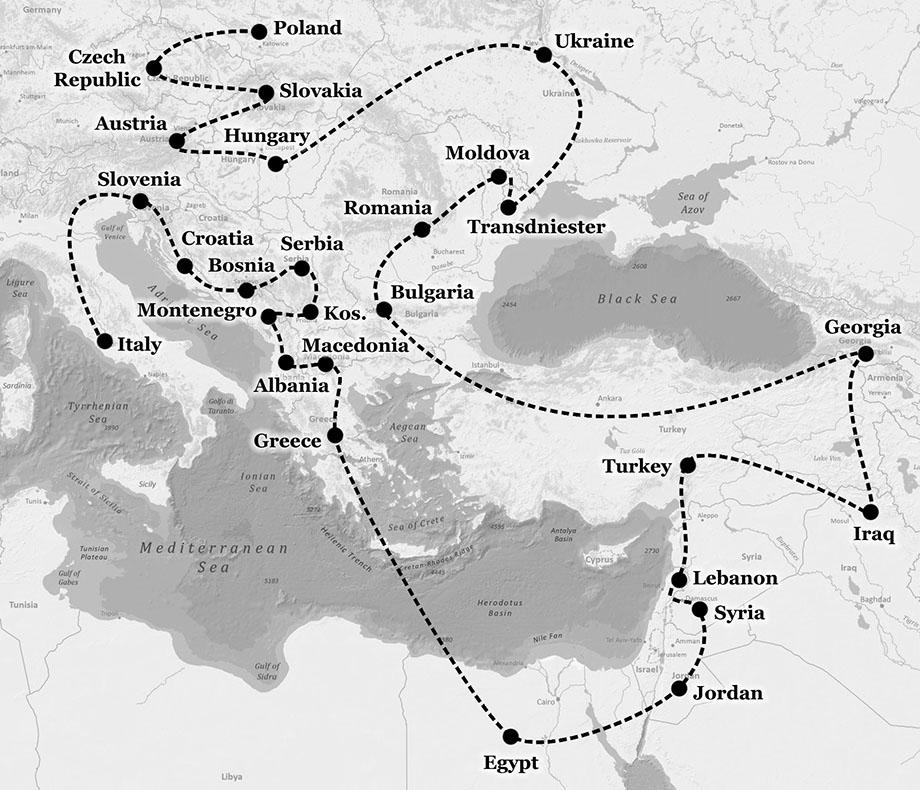
This humble corner will attempt to serve as a travel journal of sorts, cataloging all the ins and outs as, whatever way and in whichever direction the mind meanders, the body does likewise. If you have arrived here, you likely know me, and at least some of the details of this trip. Regardless, welcome, fellow traveler.
Turkey :: The Beginning
on Apr. 20, 2009
As soon as we cross the border Bryn starts me on my Turkish lessons - he is at home here, and I'm happy to have a tour guide. We make it to the Turkish side just as the border is closing. Unfortunately for me "the visa lady has already gone home for the day," so I hand my 15 euros to a guy on a motorbike who zooms away and returns twenty minutes later with a little postage sized stamp for my passport. We hike towards the dolmuş (minibus) station, and are quickly mobbed by little kids smiling and screaming "hello papa" at us. We never, in the next two months, figure out what that means. The border guys, heading home, pick us up in their car, and we rock out to Rihanna blasting on the radio for the short ride. Already I am liking Turkey.
The quick pronunciation guide: ş is 'sh', ç is 'ch', ı (i without a dot) is 'uh', ğ is silent (ish), ö and ü are supposed to be different, somehow, and v is a bit soft, almost 'w'.
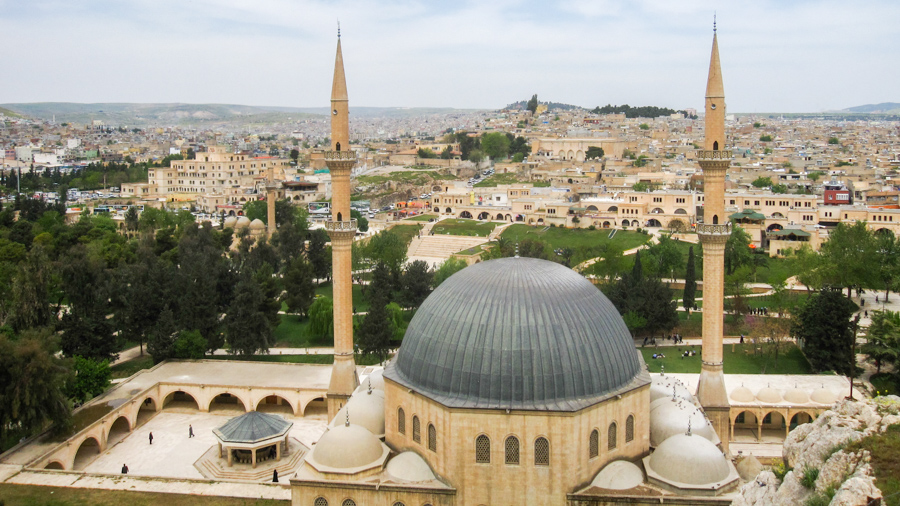
Our first stop in Turkey: Şanliurfa, where we find some budget accommodation sans incident and eat what is to be the first of many tavuk dürüm (chicken wrap from a kebab type spit), the most delicious thing ever created (after falalel, of course). The real name of the city is Urfa, the prefix makes it into "Glorious Urfa", an official name change demanded by the inhabitants after neighboring Antep turned into Gaziantep, or "Heroic Antep." The highlight here is the sacred carp (something to do with Abraham), which are constantly fed by tourists and are extremely fat. Killing one will apparently make you blind.
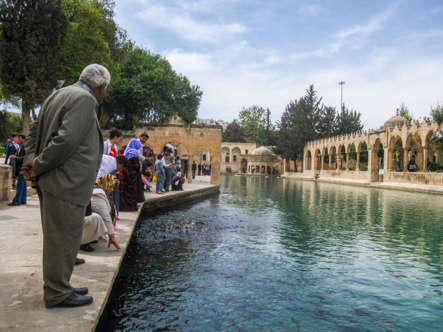
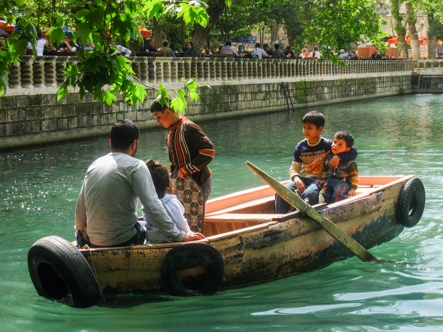
We make a quick trip down to Harran for a few more ruins and some nice bee-hive houses (not pictured). The next day we book it up towards Mt. Nemrut, a trek which turns into a bit of an ordeal. We make it, shortly after sunset, to Kahta, near the base of the mountain, and are intercepted short of the bus station by a zealous pension owner who has obviously been informed of our impending arrival. We refuse (on the principal of it all), but when we get to the station the market owner across the street starts shouting at us until we walk over - he has a friend as well. This one owns a pension in Karadut, a little village near the summit, and we are quick to agree to the 5 lira minibus transport (it is actually just the normal public minibus, which no one will tell us about, and the actual price is definitely lower) and a free ride up. We get in just after midnight - the only guests, a fact much lamented by the owners, and crash.
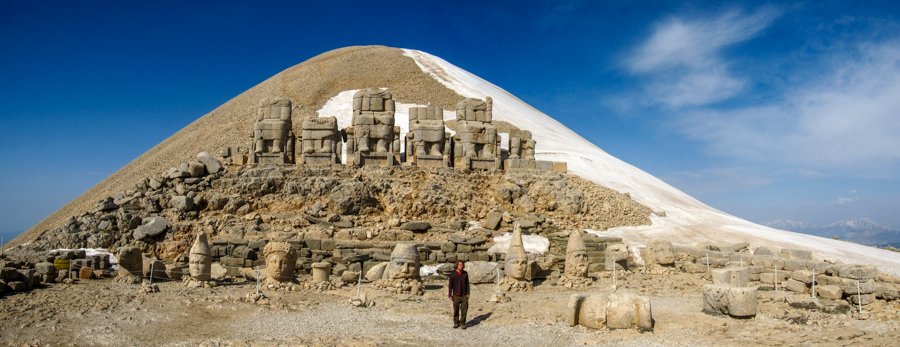
The thing to do with Mt. Nemrut, naturally, is to watch the sunrise from the top, so we set the alarm for 5am and set out, about 15km one way. A minor wrong turn, some fields and prickly thorn hedges later and we have the top to ourselves - the attraction is a bunch of giant heads, and a huge artificial peak which is actually the tumulus for a long dead king.
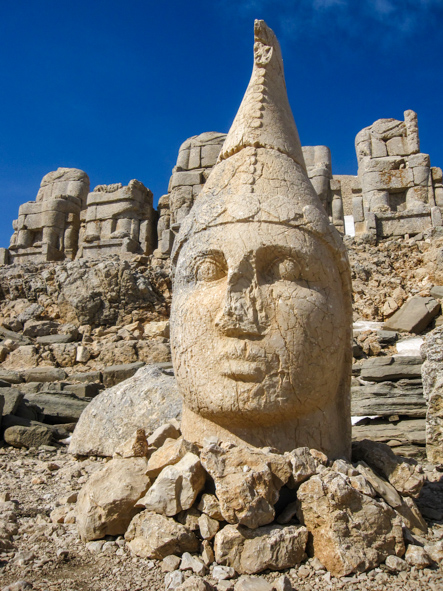
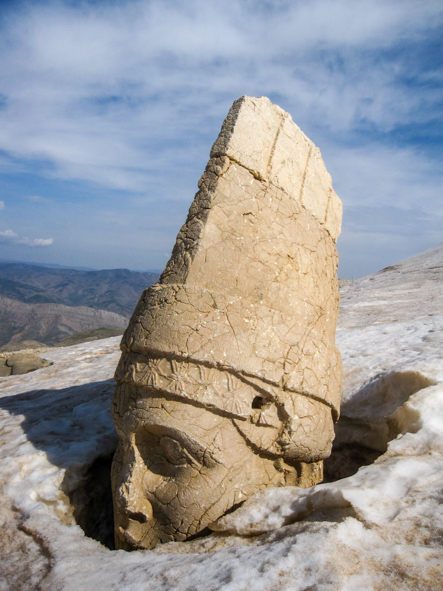
Having conquered Nemrut and returned all by 10am we head onwards to Diyarbakur, a trip which involves a curious 15 minute ferry ride across an obviously man made lake which has obliterated a portion of the road.
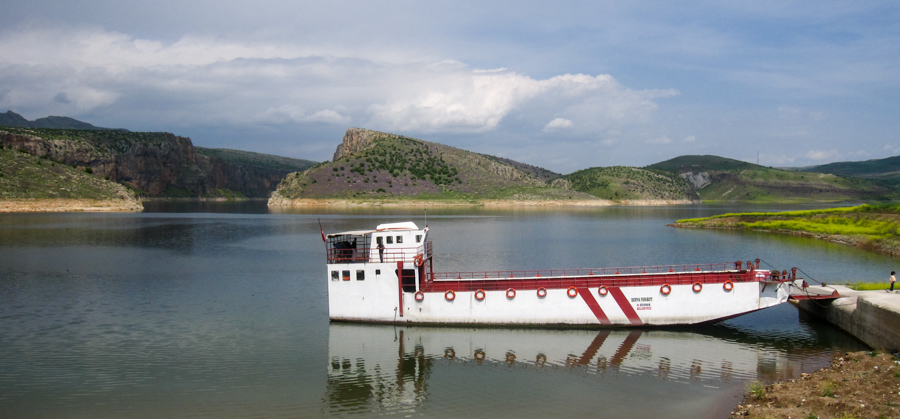
Diyarbakur, the "bastion of Kurdish identity" in Turkey, has a rugged assemblage of basalt walls encircling the old city:
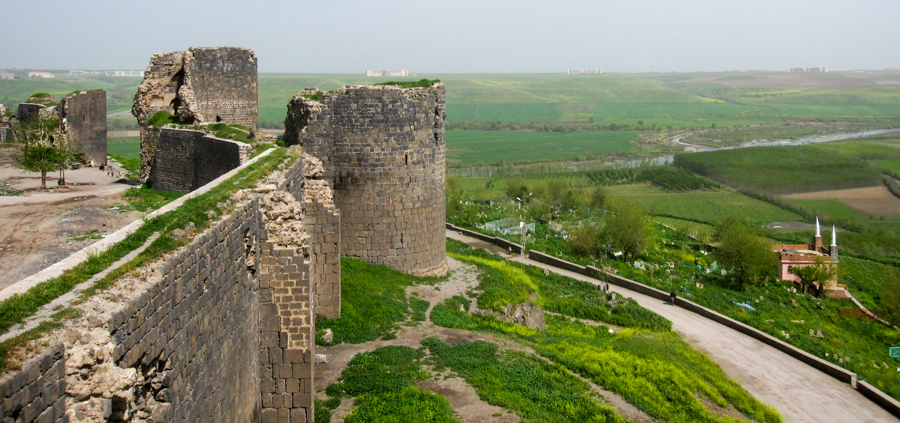
Which, the locals claim to be the second longest in the world (after the Great Wall of China). We have our doubts. Diyarbakur also features rock-throwing kids, which are an amusing image up until the point where rocks are flying towards your head. We're tourists here. We meet a 19-year old guy who is quick to admit he wants to practice English, and after giving us a bit of a tour around the city invites us back to his place for dinner. Which is where I learn that Turkey, in the East at least, is nearly as conservative as Syria - when we arrive we wait for the mother and older sister to leave the living room, and don't see them for the entire time we are there - guys and girls eat separately, though perhaps only with guests around. We eat, and talk, only with the guys, and get a crash course on the Kurdish situation in Turkey. The father is a proponent of the 'federalist' approach - he believes that Kurdistan can exist within the country of Turkey, if only they would be given more democratic representation. The son is adamant that Kurdistan should be its own republic. Topics of militarism and the PKK are dangerous to talk about here, to say the least, and we avoid all but the briefest mention.

The next morning we are off to Mardin, which definitely makes it onto the Top 10 most beautiful towns of the trip. It is perched on the side of a hill overlooking the Mesopotamian Plains, and the view is quite something.
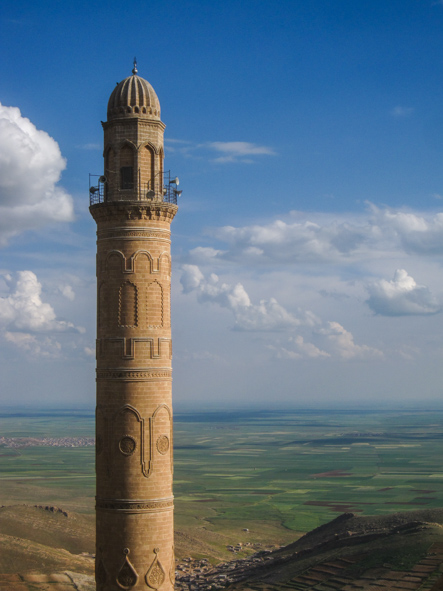
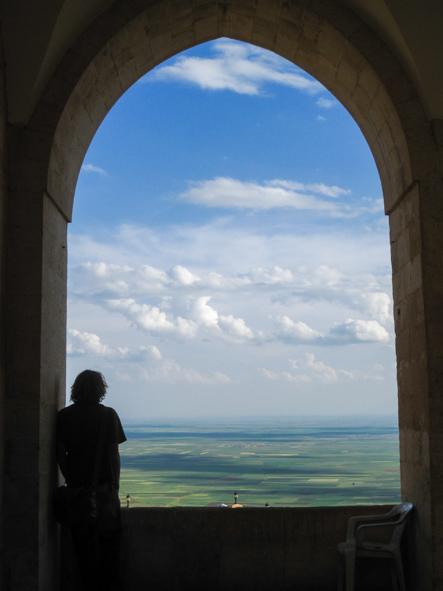
Unfortunately for us, Mardin is quite popular with Turkish tourists, and we have arrived on a weekend. That is to say, each and every hotel in the city (including ridiculously expensive ones we are ready to consider) are completely full. The one cheap option in town, Başak, proposes we sleep in reception. We counter with the roof. They agree. All in all, not a bad night on the roof - glad I have my sleeping bag. And, free is free.
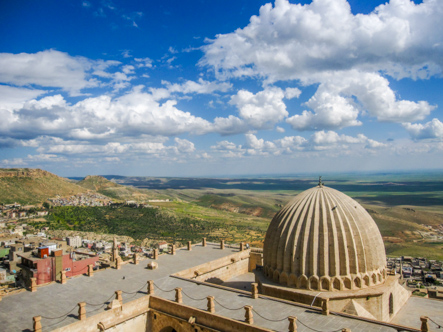
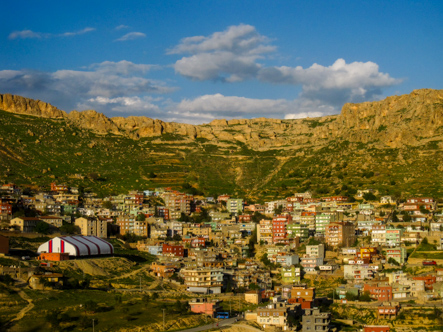
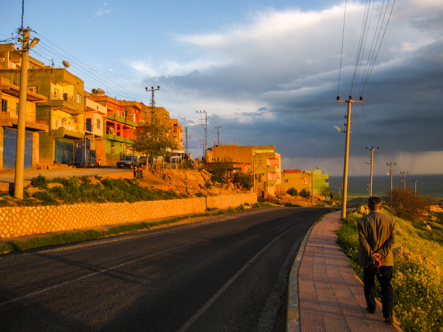
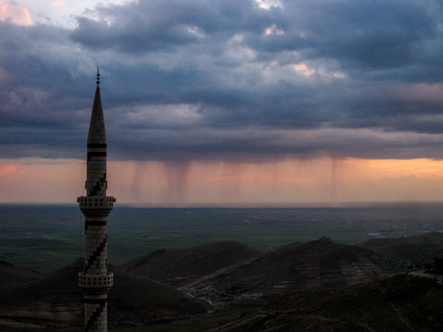
Bryn agrees to accompany me to Silopi, deep in the Southeast of Turkey, on the border with Iraq. We've discussed the subject many a time over the past two weeks and I've more or less made up my mind, though he is still on the fence. After a last minute internet session he admits that he has decided not to go - not the best news, I would prefer not to be alone, but the decision is undeniably a personal one, and I admit I won't attempt to persuade.
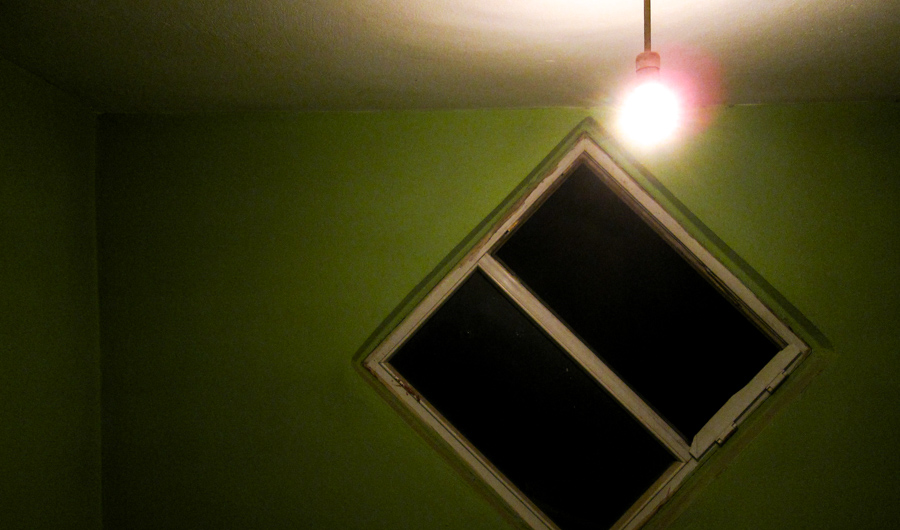
The one and only picture I take in Silopi, inside our pithole of a hotel. Not the most restful night of sleep I've ever had.
Iraq
on Apr. 25, 2009
I wake up in the morning to see Bryn off on the 7am bus to Van far out East. His parting gift to me is a giant switchblade knife he acquired in Biskek, the capital of Kyrgyzstan, after being told it might come in handy there. "Just in case." The gift doesn't exactly fill me with confidence. The previous night we had been accosted by taxi drivers, and more to get them off my back other than any other reason I had vaguely agreed to go with one, who promised to meet me outside my hotel. Low and behold, when I wake up and make it downstairs he is there, waiting patiently. Things turn out for the best, though. The few accounts I've read have described all transport to/from/and inside Iraq as being crazy expensive, including a private taxi across the border, but I end up in a taxi service filled with Turks (or Iraqis) all making the crossing. Some quick photocopies of paperwork, a chai break, and we're off, out of town and past the thousands of parked trucks waiting their turn at the border.
My Middle East guidebook helpfully has no section for Iraq, and with no internet, no Google maps, and no idea of what to expect, my sole source of guidance are these MS Paint-style maps, from a previous backpacker (pointing out essentials like "kebab shops" or "book market"), which I have photographed from a computer screen a few weeks ago:
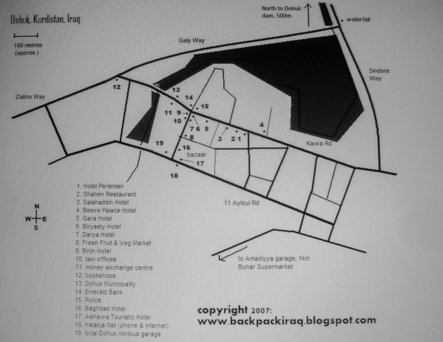

First stop: Turkish border control. I slide over my passport, he types something into the computer, apparently has some inner struggle, and hands it back to me. "Problem, visa, problem, computer," he says, and shrugs, "go to Qamishle, fix problem". Qamishle is several hundred kilometers to the West, on the Syrian border, and as I am pushed out of line by other impatient passport holders I swear under my breath – something with the visa when I came into Turkey must have gotten screwed up. The whole "visa lady has already gone home" screwed me over, and my trip into Iraq is over a bit sooner than even I expected. The other guys in the taxi are read to go, the driver looks at me questionably, and I ask about catching a taxi back to Silopi, ready to give up. Finally my taxi driver mentions a few key phrases which actually fall within my vocabulary, "fuloos, fish mushkila, …" i.e. money, no problem. And so I find myself being advised, by my taxi driver, to bribe the Turkish border official in order to let me out of the country. Very well – I inquire what the appropriate amount might be, he suggests 50 USD. I can't afford it (even if I really could) and suggest 20 USD instead. He shrugs, runs over to the passport booth, sticks his head inside and has a short conversation. He runs back, nods, I stick a twenty inside the front flap of my passport, he grabs it and tosses it to the official, and twenty seconds later I am back in the taxi, passport on the dash, happily granted leave from Turkey. The driver obviously informs the other passengers about the bribe, who tisk tisk, Arabic/Turkish fashion, in disapproval (at the border official, I'm hoping). I note that this is the only time on the entire trip I have to bribe someone (excluding, perhaps, Transdniester, which has yet to come), and doesn't speak well of Turkey's EU bid and the whole no corruption policy therein.
With that rather adrenaline inducing border crossing out of the way we are soon on the Ibraham al-Khalil bridge, and then at the Iraqi border, where we crowd inside a nice sitting room and are served with tea as our passports are processed. The proper responses to prompted questions in order to gain entry:
- Purpose of visit: tourism (just tourism)
- Profession: student (avoid anything fancy, i.e. journalist)
- Amount of cash you are currently carrying: I lie, low, and get frowned at. I have the impression they want you to be carrying more than enough – Iraq is cut off from the international banking networks so although there are ATMs all over the place none of them work.
- Why do you want to come to Iraq: just tourism (avoid elaborate story of the kindness of Kurdish people previously met in Syria, which got me a blank stare and a repeated question)
- Do you know anyone / have any friends here: no.
- Would you like to visit Kirkuk or Baghdad: definitely not.
In that case, "Welcome to Iraq". Or more correctly, "Iraqi Kurdistan", "The Autonomous Region of Kurdistan", or if you're feeling political, "Kurdistan." (Coincidentally, likely the reason I ran into problems at the Turkish border, since Turkey actively opposes the idea of a Turkish Kurdistan, and is probably not all that happy to see tourists headed towards the Iraqi version, the most successful out of any of the Kurdish populated countries). I am actually the first, from the taxi, done on this side of the border, with a giant stamp in the passport and a warm welcome to enjoy my stay. We spent the next hour waiting just beyond the bridge for a convey (which never appears and we eventually just leave without), and then negotiating with the local taxi cartel for a ride to my first destination, Dohuk. Which, is beautiful, and definitely not the image I had in my head of an Iraqi desert.
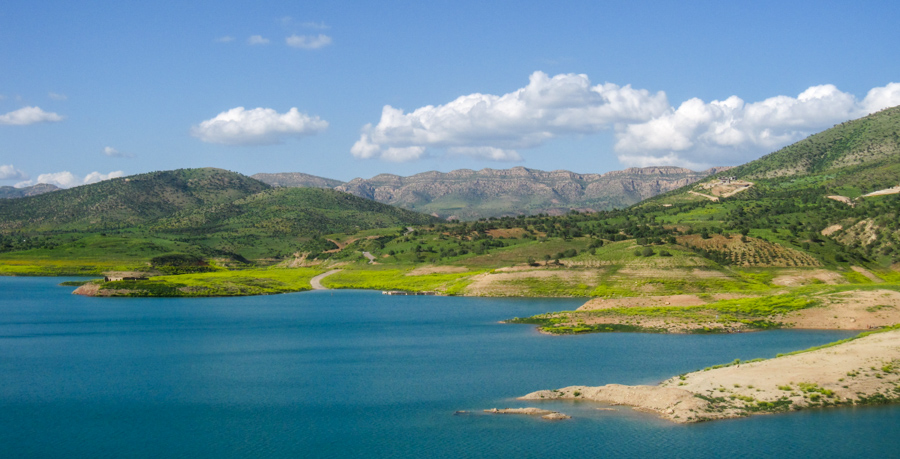
When I first thought of coming, in Egypt, after realizing how close I was going to be in both Jordan and Syria, I imagined taking a taxi out to the border, seeing some giant "Welcome to Iraq" sign, a heavily militarized area manned by US troops, snapping a picture, perhaps crossing over for a few minutes, and that's about it. A few google searches later reveals two or three (publicized) trips, my inspiration, from June 2007, and discovered later, March 2009, just days before I go. About two months later I was to meet someone with a new copy of the Lonely Planet Middle East (published: May, 2009), which now includes extensive information and maps on pretty much everywhere I went. I get the feeling that it is soon to be swarming with backpackers.
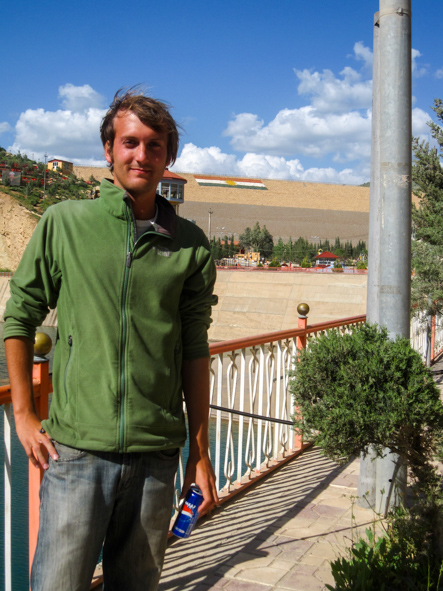
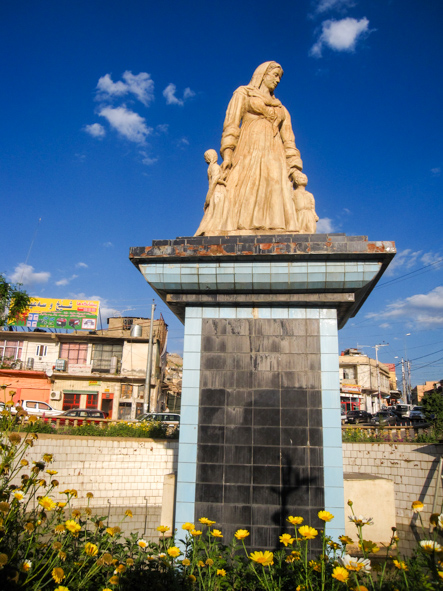
That said, no one was ever overly surprised that I was there. Curious glances in the street were at a normal, Eastern-Turkey level, and I never once felt the need to say I was from "Canada", as I had been prepared to do. Strange, then, that Americans can travel openly in this part of Iraq and actually feel welcome – the majority of the population is pro-American and appreciative of the US role in putting them where they are now. That is, free of Saddam and largely independent (with their own government and military), even with frequent and random power blackouts, which everyone just seems to ignore, and other such ridiculous difficulties in life.
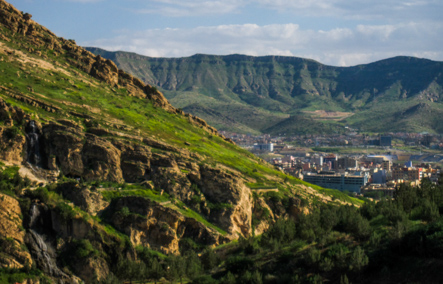
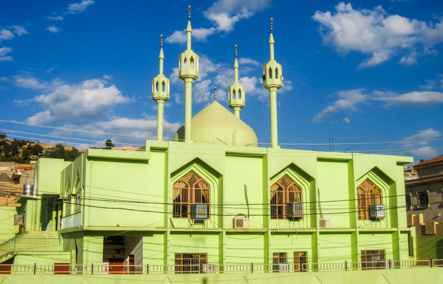
In Dohuk I meet Samir, and spend the next few hours polishing up my Kurdish. He knows virtually no English, is fluent in Arabic and Kurdish, and is at about the same level with Turkish as me. It is invigorating, to say the least, to successfully communicate with someone else in four languages (three of which I am terrible at) where any one would be a total failure. The most important phrase in Kurdish – "tu janna, min hashtetkem". Or, "you're beautiful, I love you." I love Dohuk, for a multitude of ridiculous reasons, including that they are happy to change my Syrian pounds (refused everywhere in Turkey) and they have falafel (nonexistent in Eastern Turkey).
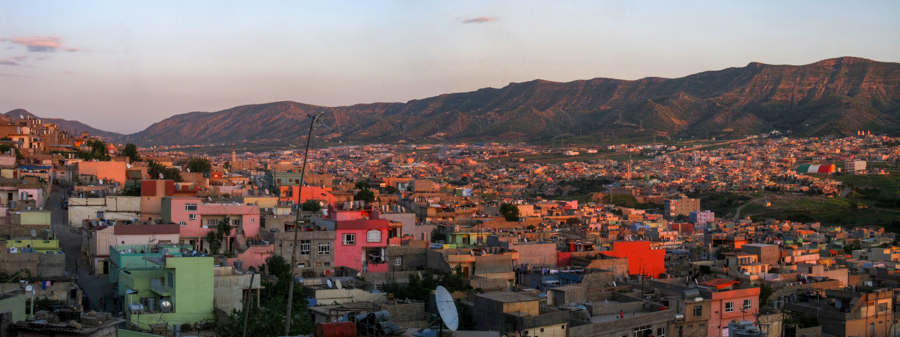
The next day I find another taxi service outfit with rides to Arbil (or Erbil, or Hawler, in Kurdish), the capital, and jump in an very aging BMW which is to be my taxi only to realize it is nearly identical to my car back home. I am a bit suspicious as we start making circles through town, passing by the taxi guys over and over again, but eventually we pick up one more on one of our passes and head off, into the desert. Which it does become – desert, leaving the mountains behind. This stretch of the trip takes us near Mosul, and I get progressively more worried as the signs on the freeway announcing the distance to said city slowly decrease. When we are about 10km away we veer off the freeway, following a convoy of like minded folks, taking a little shortcut through the desert in order to avoid a city which no one, apparently, has any desire to go through, or near.
We wind through the sand, while each car is blinded by the dust cloud kicked up by the car in front of it, and so veers off to the side to get a clear view. Eventually our group is a half dozen or so cars parallel to each other, driving like some sort of army formation, trying to see through the collective dust-storm that we manage to create. And then we encounter the other group, headed the other way. The scene reminds me of the game Destruction Derby, or whatever it's called, where cars mill about in a stadium trying to ram into each other until only one is left standing. Except here the objective is the opposite, aided by the omnipresent honking, and with 10m or so of visibility (less, once our driver attempts to use the cleaning fluid and creates a dusty smear all over the windshield) this is quite fun. Ok, we make it, and are soon enough back on the road, onwards to Arbil.
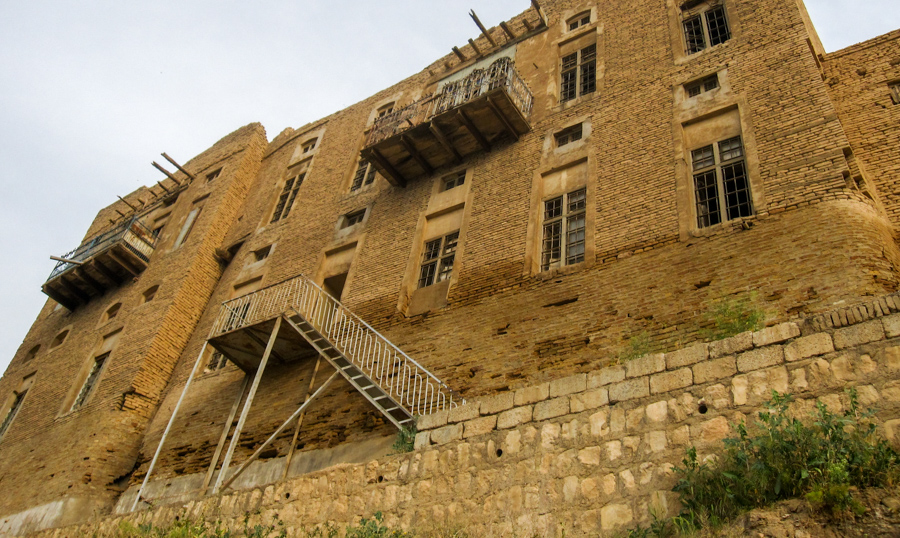
The citadel in the middle of the Old Town has great potential, though it's readily apparent: there aren't many tourist destinations in Arbil. The curiosity is the money chargers, who are all old men sitting on the side of the road, the entirety of their business sitting as stacks of thick (several inches thick) 10,000 and 20,000 Iraqi dinar notes rubber banded together on cardboard boxes. "Must be a safe country." Wandering around that night (something I avoid my first night in Dohuk out of precaution) I run into an Iranian fellow, a tourist, who offers to share his hotel room with me and goes through great lengths to convince me that he can be trusted. Not to say that I don't, but I'm not sad that I've already paid for my room for the night.
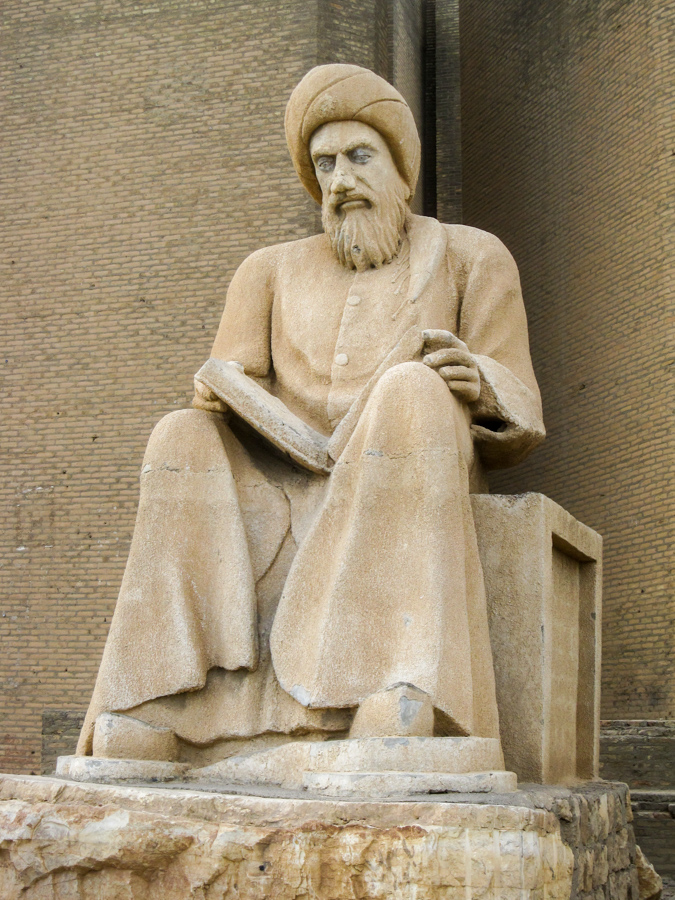
The next morning (moving fast) I opt for the bus out to Sulimani (or Sulymaniyah), quite far out to the East. Rather, the only option is the bus, which I've read passes through the suburbs of Kirkuk en route – a situation to be avoided for any Western tourist. I am not quite sure if we ever do, but if we do, they are definitely the suburb suburbs, and things never feel too out of hand. I see, for the first time, pillars of fire erupting from the ground (ignited oil wells? not sure, or if they are on purpose? reminds me of scenes from the movie Jarhead). A highlight of Sulimani is the Amna Surak, or "Red House," a former prison of Saddam Hussein where Kurdish fighters were tortured. Now converted into a museum, of sorts.
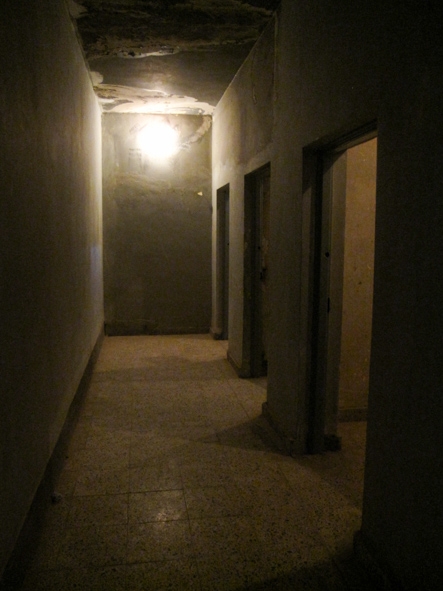
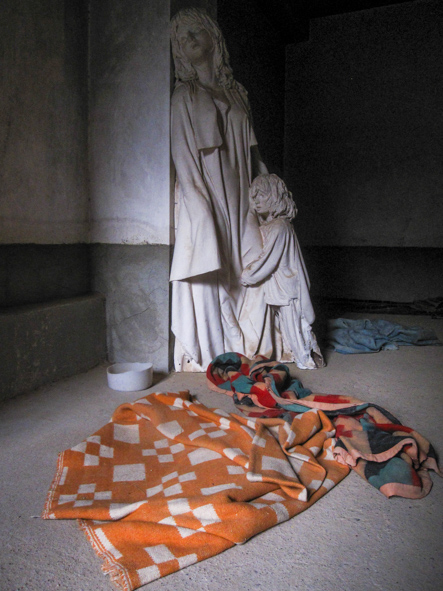

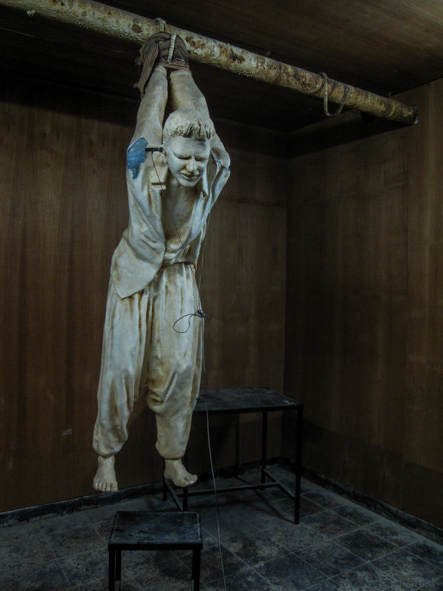
It is closed when I arrive, but a young Kurdish soldier is happy to open it up for a tourist and give me a private tour. When we get to the room featuring a model of a guy, strung up by his hands, being tortured by electroshock, and featuring an audio recording of an actual torture session in the background, he lights up a cigarette and zones out as I stand there. The combination of the atmosphere, driven home by the realization of where it, and I, am, is surreal. Not in a calming way.
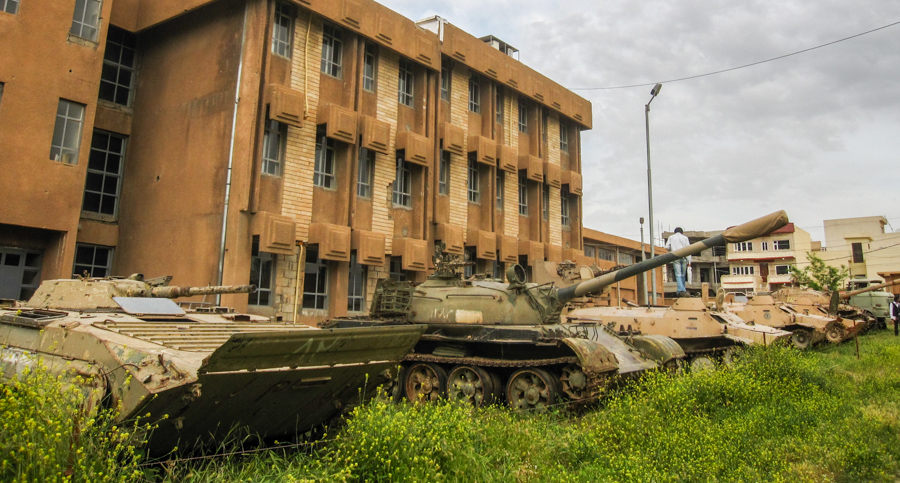
I am told that to leave Sulimani I have to get to some place called the "Baghdad Garage", which doesn't sound like quite what I would be hoping to look for, but in addition to destinations such as Baghdad, Kirkuk, and Najaf (buses which I could have easily hopped on without question, to find myself in the center of Baghdad, as easy as that) is good old Arbil.
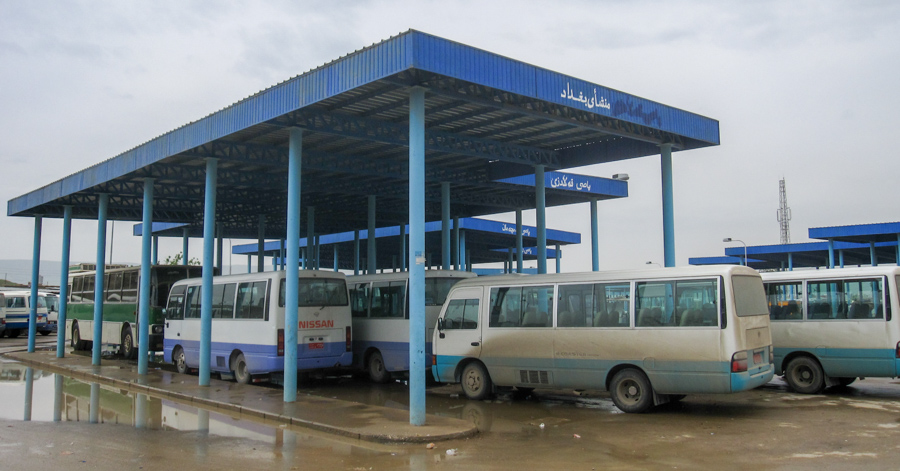
Retrospective: One of the most bizarre stories of this trip occurs just two months later, after I've left Sulymaniyah. Backpackers begin to mention a crazy piece of news: three American hikers have been arrested by Iran, on suspicions of being CIA agents, for having 'accidentally' crossed the border between Iran and Iraq. They were 30km away from Sulymaniyah, visiting a nearby waterfall -- one I had also heard about when there, a recommended day trip. Stranger still: one of the three had graduated from UC Berkeley, as had I, just less than a year before. Of the very few people back home I had told of my trip to Iraq at that time, a tiny bit of uncertainty undoubtedly emerged.
What?
Indeed.
From Arbil back towards the border I seem to acquire a somewhat novice taxi driver, who doesn't quite know where the "through the desert" shortcut is to avoid Mosul, and as we get closer and closer everyone else in the car seems to be freaking out – the only word I can understand is Mosul, which doesn't exactly fill me with confidence. Eventually we wander around in the desert for awhile, stopping to ask for directions from random guys holding the ever present AK-47s, do some circles, stop to buy some produce from a little shack, and are finally headed in the right direction.
Shortly after, I am involved in my first ever high speed car accident – no better place than Iraq? No one is hurt, though our factory new taxi is pretty messed up and the old guy's car (his fault!) fares likewise. Pulled over in the median we, at one point, acquire no less than a dozen spectator cars, everyone stops and jumps out to see what the problem is, lend their assistance in the shouting match which has been occurring non stop between the two drivers, or otherwise just stand around and smoke.
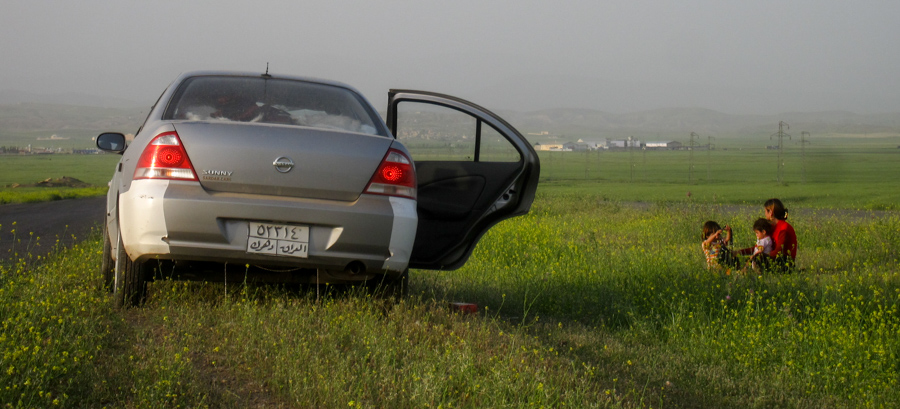
A random guy tells me to stick with him, he is headed to Zakho (the border) and I can join his ride, when it arrives. At some point I find myself the object of curiosity of a group of five or six guys, one of which, after my typical "California" response of origin, pulls up his shirt to reveal massive scars on his chest and arms. "From American bomb," he says, and suddenly I am in the situation Bryn was seriously afraid of – meeting that one guy whose dad, brother, or son was killed in the war, or otherwise has the motivation to make your day unpleasant. To be honest, I'm not sure if he is serious, though in the end I suspect he is, but nothing develops of it – whatever I said in response must have been good enough.
An hour after the accident the police finally arrive, in the form of a pickup truck full of soldiers carrying automatic weapons. Perfect to resolve a dispute and figure out who was to blame. And, good timing for a sunset.

Shortly thereafter my ride actually materializes, and something gets said to the driver (along the lines of, this tourist just got in an accident, his ride is free) which gets passed from driver to driver for the rest of the night, and gets me, via 3 taxis, for free, back to the border. I catch the same service taxi back over, no problems on either side, and after agreeing to smuggle a few cartons of cigarettes (well, the "limit", per person, so no harm done) for the driver, we also stop at the duty free store where I buy a few more cartons for the various guys using my passport. By 1am I am back in Silopi, crawling into bed in the familiar hotel, and pretty happy about it. A little whirlwind tour of Iraq over and done.
Retrospective: The 2020 US State Department report states that: "Despite internal political divisions, the recent incursion by Turkey into northern Syria, political instability in Baghdad and areas of southern Iraq, and the ongoing ISIS threat, the Iraq Kurdistan Region remains relatively secure." A rather long and ominous list of... issues, to say the least. In comparison, when I visited in the first half of 2009, Iraqi Kurdistan was always conveyed to me as a relatively safe place, which buoyed my optimism in making the trip. (In comparison, other destinations, including Mosul, Kirkuk, and Baghdad, at times only a few kilometers away, were clearly portrayed to me as dangerous to the extreme -- as in, it would only take one bad bit of luck for a Western visitor to not survive a visit). Six years after the U.S. invasion on March 20, 2003 the region, and Iraq as a whole, was in 2009 the least violent and safest it had been in a long time. Six years later, after the withdrawal of American troops, the rise of ISIS/ISIL, and unprecedented violence and loss of life, it assuredly resumed the dubious distinction of being one of the most dangerous places in the world. I am grateful to have had the opportunity to travel to Iraq in this lull, wedged in between two disastrous episodes of war.
Turkey :: The East and Ankara
on Apr. 30, 2009
A 7am bus takes me towards Van, via eleven hours of winding mountain roads and two little kids sitting next to me throwing up the entire time while mom did likewise, and dad looked on. We hit Tatvan, on the Eastern end of the lake (the largest in Turkey), absolutely beautiful with snow-capped mountains surrounding it on every side.
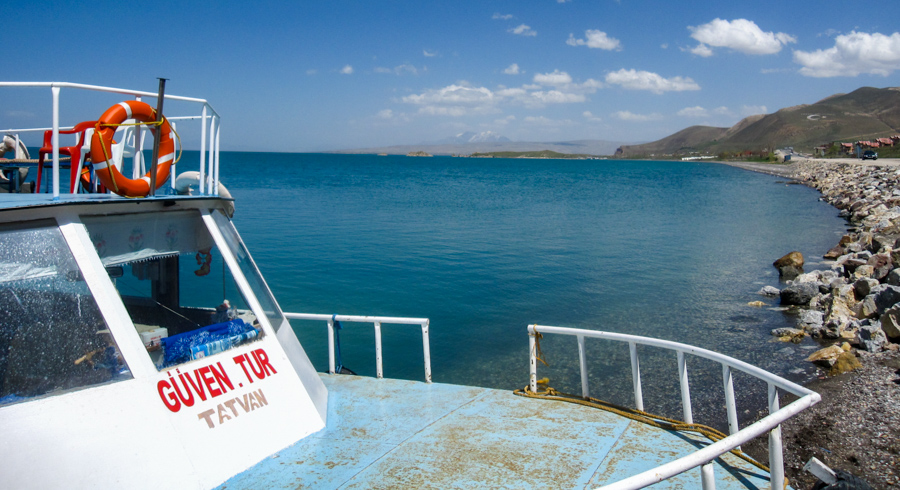
Van itself was nothing like what I expected – new, modern, full of young people bustling about at all hours of the night. I am still definitely in Kurdish territory though, I talk to a few locals who admit that "Turkish" people don't make a habit of coming here, they aren't particularly welcome. Besides the massive lakeside fortress I make it out to Akdamar Island, home to such and such a monastery, and a rather nice view.
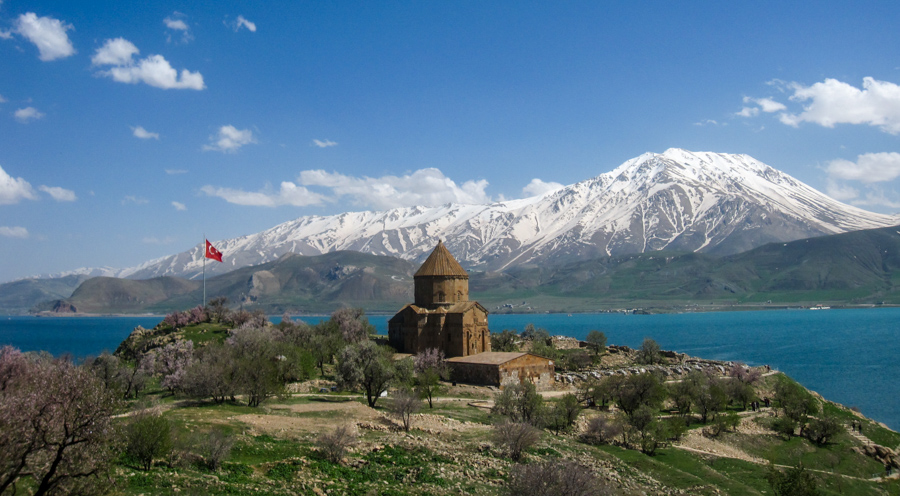
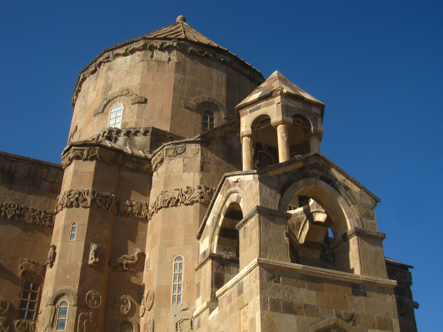
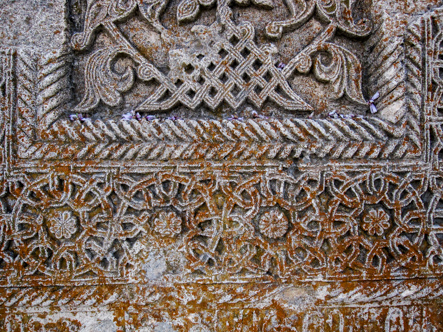
It makes me think of a "poor man's Galapagos" actually – I nearly step on a turtle while hiking around, and then stop and look around and see a whole invasion of turtles slowly making their way over the landscape. One side of the island is a sheer cliff, with birds zooming around so fast you can hear the air make way.
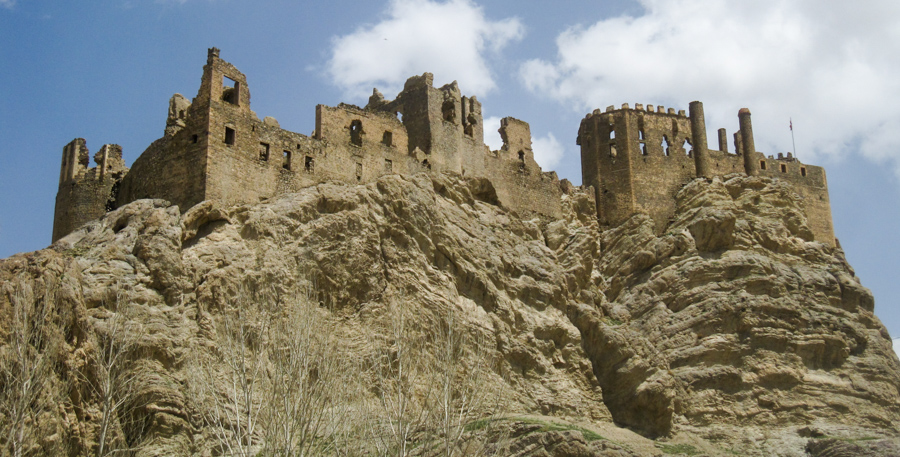
The next day I make it down to Hoşap Castle, where I encounter my second contingent of rock throwing children. This time, however, they are atop a rather impressive set of castle walls, and have the distinct advantage, bombarding me from above. I decide to make my approach a bit later, by which time there is a group of middle-aged Kurdish guys playing tourists and the kids are on their best behavior towards me, all smiles. Infuriating.
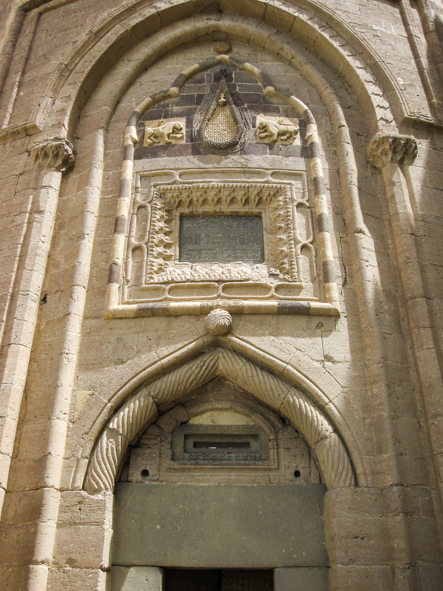

I minivan hop my way to Çavuştepe, a Uranian site, and back through the countryside around Van.
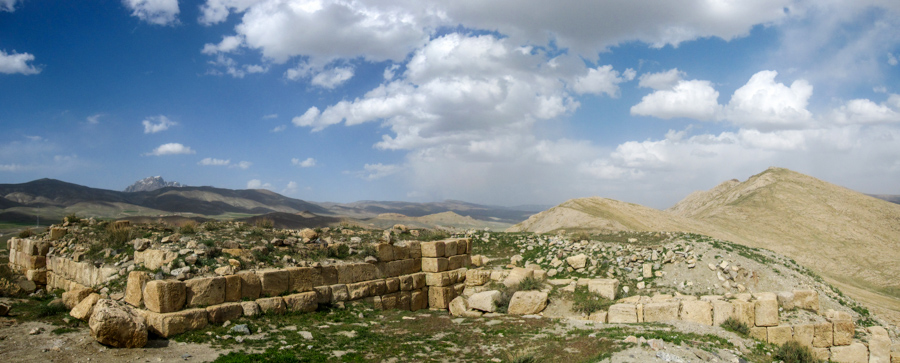

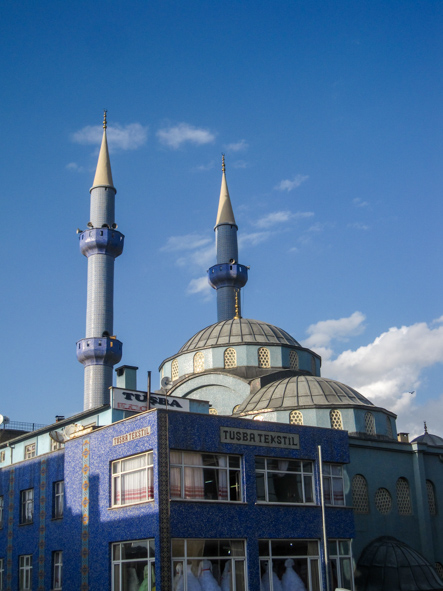
The next day I am quick to move on – halfway up to Kars, in the far Northeast of Turkey, is Doğubayazıt, sitting under the shadow of Turkey's tallest mountain, Mt. Ararat (5137m).
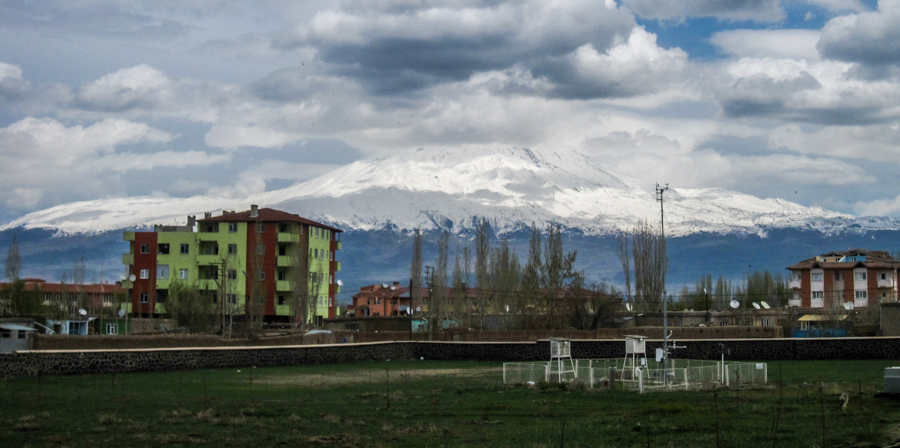
A few hours of hiking into the hills lands me at the Ishak Paşa Palace:
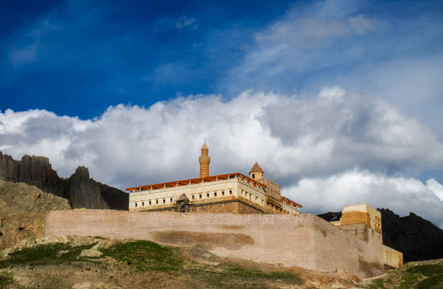
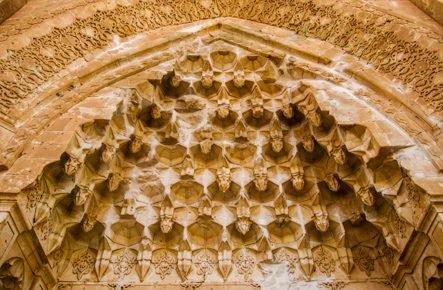
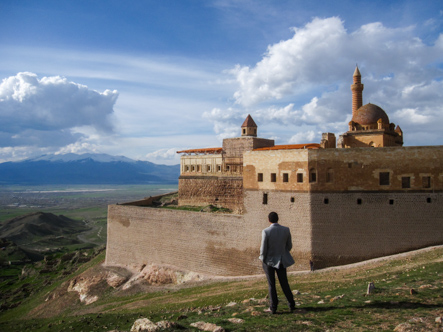
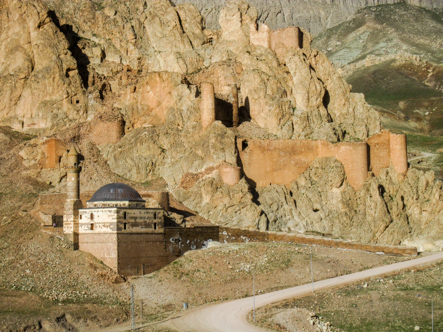
Up to Kars, which has been on my unavoidable list ever since I read the novel Snow, by Orpan Pamuk – one of the best books I have ever read, for sure. To be honest, Kars isn't quite the same as I had pictured after reading about nationalist vs religious vs communist struggles in the dead of winter some twenty years ago, but it is still a depressingly grey, Soviet-esque, town, exactly what I was looking for. Some caretaker at the Belediye (town hall) insists on posing for me.
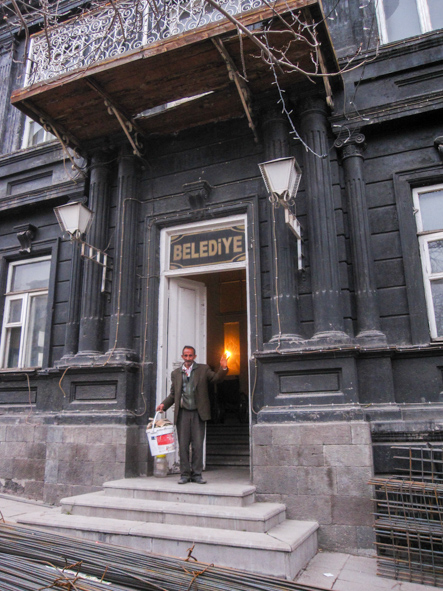
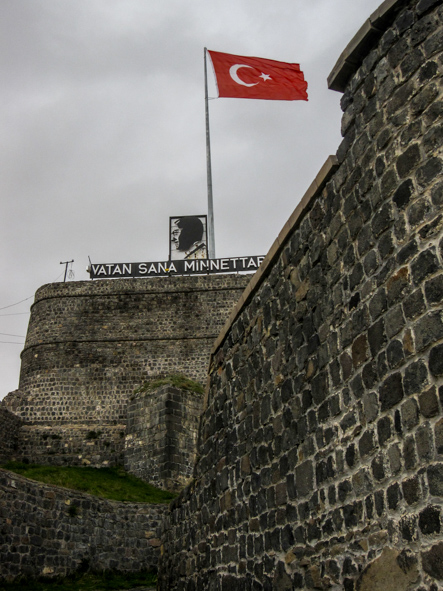
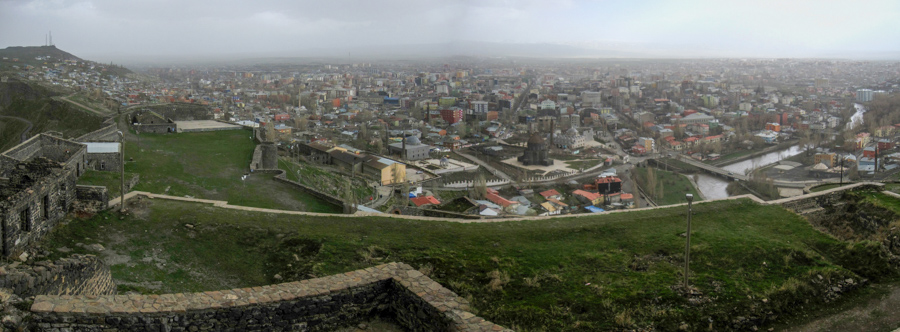
I team up with 1 Switzerland and 1 Belgium and we hire a taxi out to Ani, the medieval capital of Armenia.
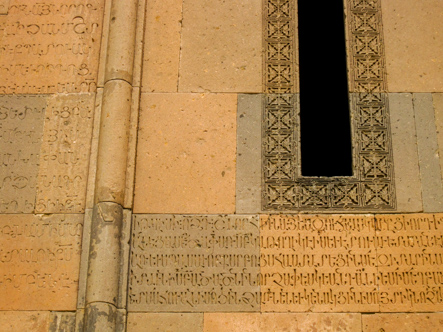
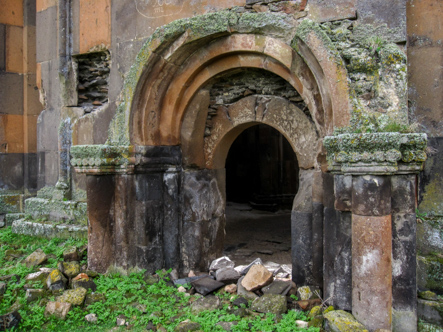
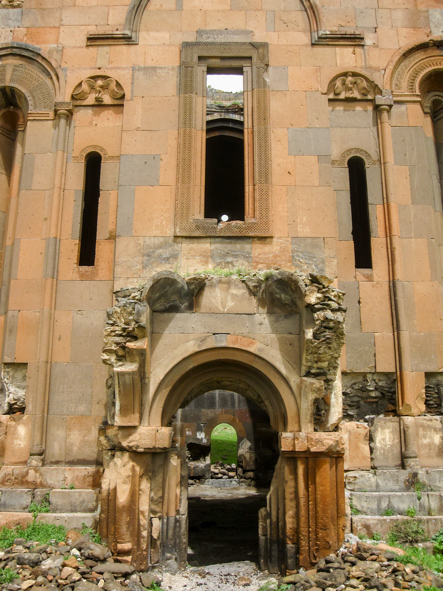
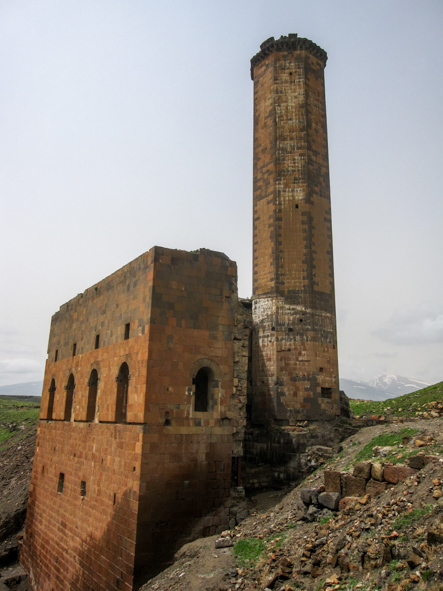
Ani is only a few hundred meters from the current Armenian border, which has been closed since 1993, a river with Russian military bases spaced out evenly on the other side. Russia and Turkey are not friends.
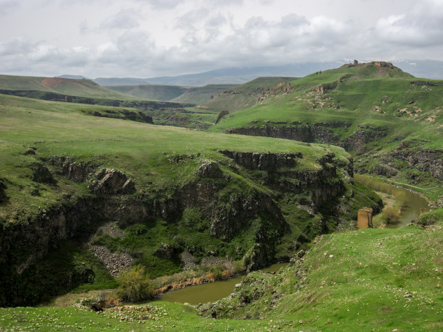
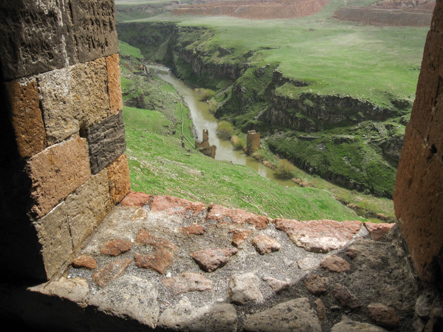
Thinking perhaps of a quick trip into Georgia, or else up to Trabzon on the Black Sea Coast, I get a message from Bryn telling me to get over to Ankara as quickly as possible, to partake in a massive music festival at the local university, Odtu (the Turkish equivalent of Harvard). A day stop over in Erzurum, where I meet, among other people, an old Turkish man who stops me on the street and confesses that he is addicted to buying Iranian carpets shortly before accusing me, as a proxy for capitalism, as being far inferior to socialism. We have a nice little chat, as I try not to miss my night bus to Ankara.
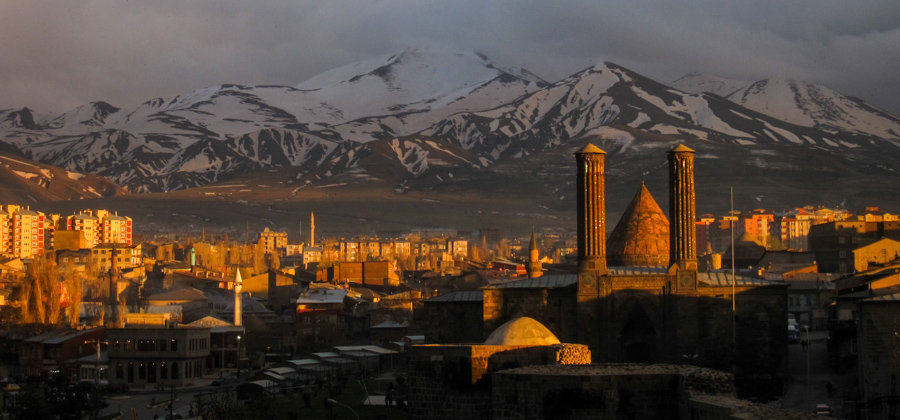
The next few days I spend enjoying the amazing hospitality of several lovely Turkish ladies (and gentleman), staying in their apartments and heading out, each day, to the festival. Which takes place on campus, guarded by Turkish military (Odtu is apparently a hotbed for socialist troublemakers, reminds me a bit of Berkeley) – apparently on the first night, which I missed, there was a massive pro-Communist march, complete with hammer and sickle flags. A few different stages of music occupy a few thousand people during the day, where the usual procedure is to find a spot, buy some illicitly-smuggled-in beer from the numerous entrepreneurs taking advantage of the rather lax alcohol ban (not allowed at the entrance gates, but not enforced whatsoever inside), and settling down. At night, we move into the stadium for the main stage performance, before hitting bed (or not) before the sun rises, and then rinse and repeat. The last night a guy called Hayko Cepkin on the main stage, blasting out some rather hard and good Turkish metal, while crazy fans of the #1 football team in Turkey, Beşiktaş, pop a bunch of flares at the top of the stadium and unroll a huge flag.
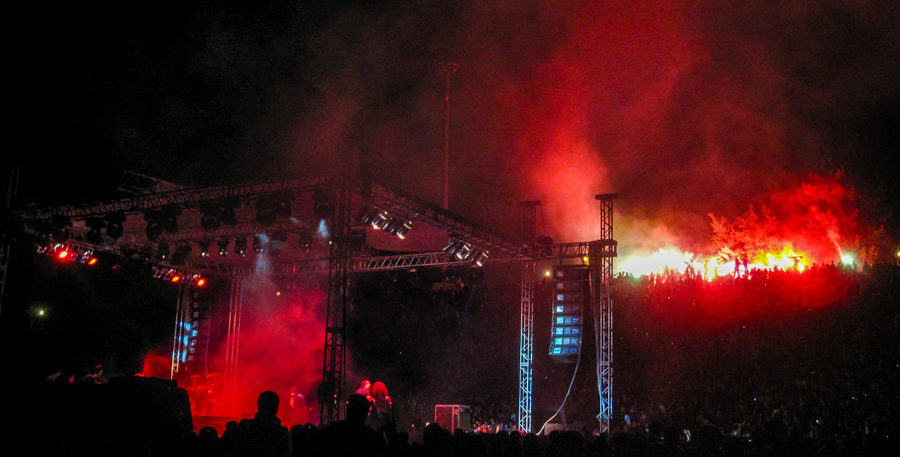
By the time the festival is over sightseeing in Ankara has taken a bit of a back seat, but we do make it out to the mausoleum of Atatürk, Anıtkabir, the founder and first president of the Republic of Turkey, whose statue can be seen in the main square of pretty much every city, and who is, more or less, revered by all Turkish people.
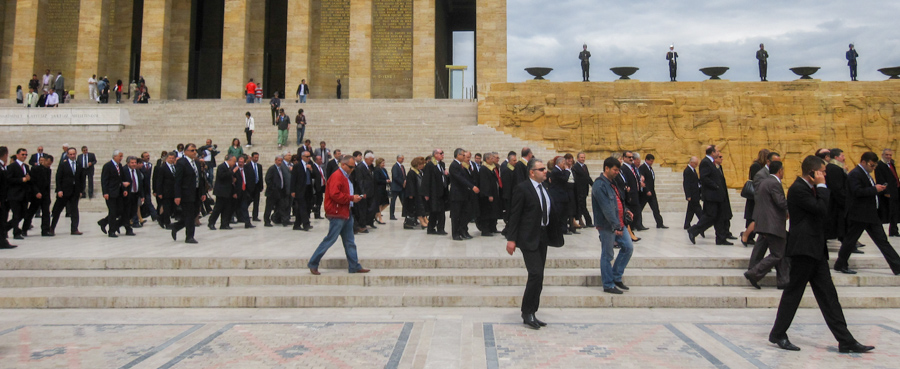
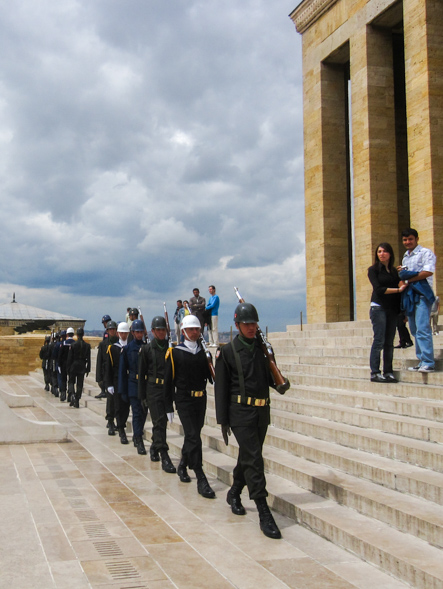
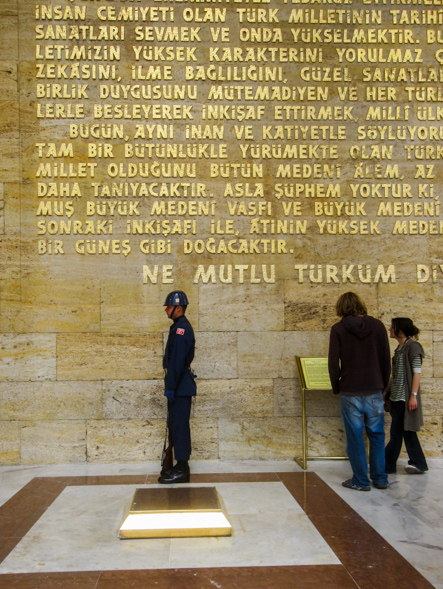
We read his Address to the Turkish Youth, a rather poignant and fitting episode at the time.
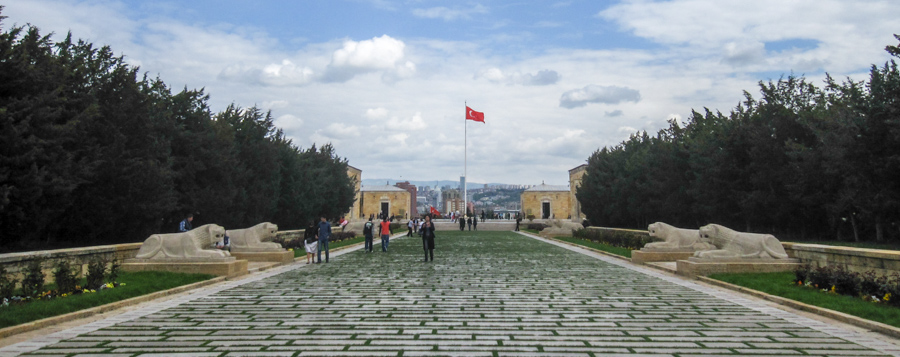
Turkish youth! Your first duty is to project and preserve the Turkish independence and the Turkish Republic forever . This is the very foundation of your existence and your future. This foundation is your most precious treasure. In the future, too, there may be malevolent people at home and abroad, who wish to deprive you of this treasure.
If some day you are compelled to defend your independence and your republic, you must not tarry to weigh the possibilities and circumstances of the situation before taking up your duty. These possibilities and circumstances may turn out to be extremely unfavorable. The enemies conspiring against your independence and your Republic may have behind them a victory unprecedented in the annals of the world. By violence and ruse, all the fortresses of your beloved fatherland may be captured, all its shipyards occupied, all its armies dispersed and every part of the country invaded. And sadder and graver than all these circumstances, those who hold power within the country may be in error, misguided and may even be traitors. Furthermore, they may identify their personal interests with the political designs of the invaders. The country may be impoverished, ruined and exhausted.
You, the youth of Turkey's future, even in such circumstances, it is your duty to save the Turkish independence and Republic. The strength you need is in your noble blood within your veins
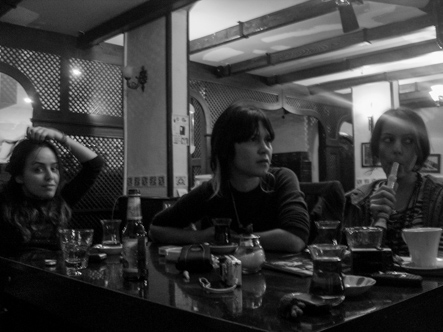
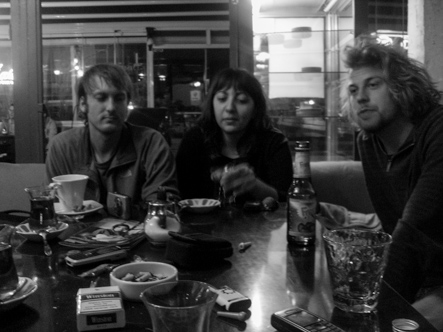
Bryn and I say a rather difficult goodbye to recent friends, and with promises to reunite soon, are back on the road together.
Turkey :: Black Sea Coast
on May. 11, 2009
Heading North from Ankara we stop for a night in Sanfranbolu – the highlight of which is "old houses," not typically up there on my list of must sees, but Bolu is a really cool Ottoman city built around a central hill and everything pretty much crumbling into nothingness.
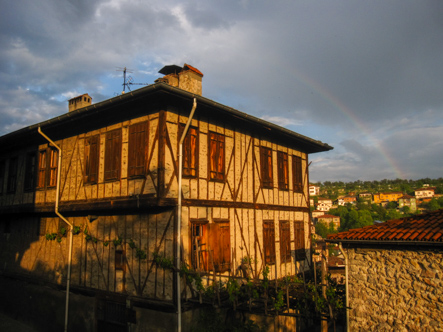
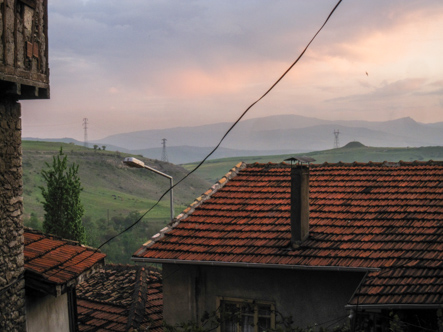

Perfect to wander around at sunset talking pictures, startling the local dogs, and getting told by old men to get out of their backyards. I swear it was a path...
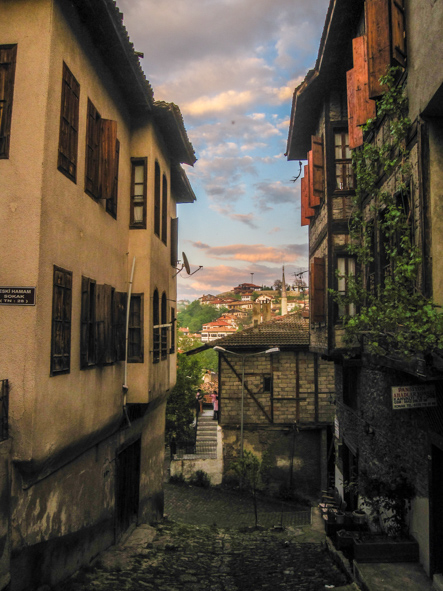
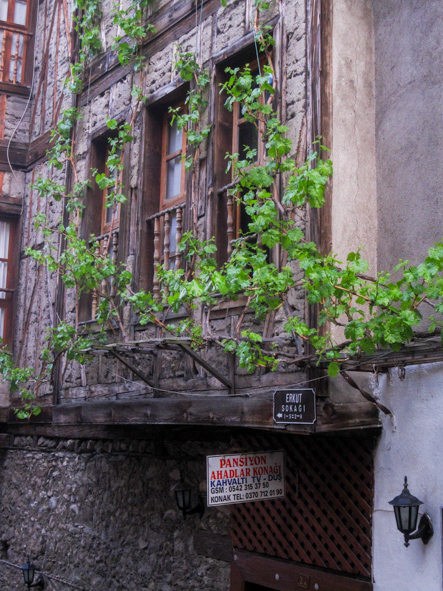
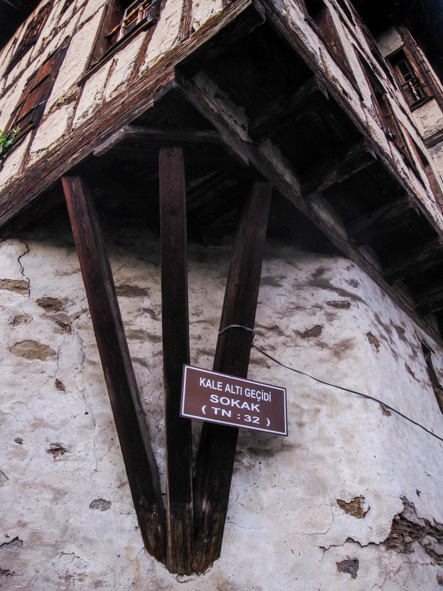

A nice town at sunset.
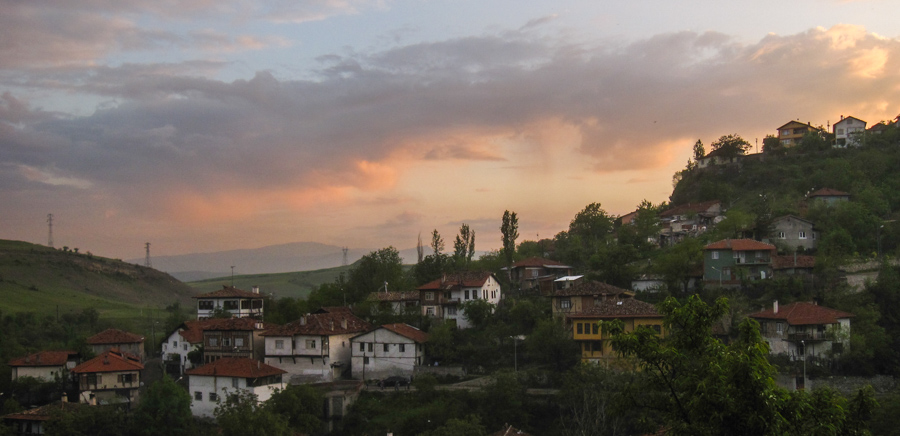
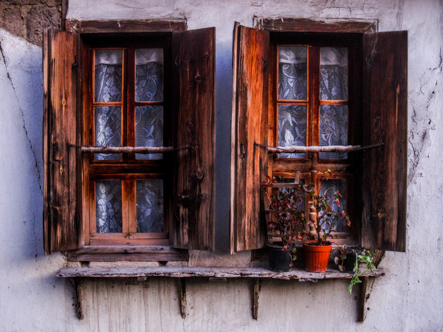
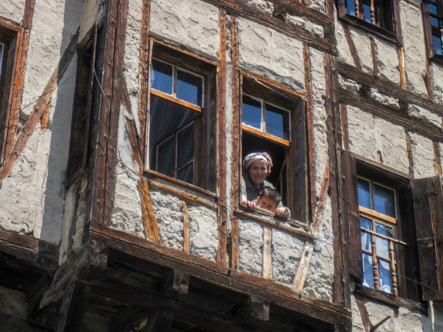
Next stop, Amasra, and my first view of the Black Sea. While wandering around in search of a cheap hotel we are accosted by a group of old ladies leaving the park who want us to rent an apartment. With plenty of Turkish in hand to make it happen, we are soon enough deposited in some apartment in a housing block and make an appointment for the next morning to "check out." Amasra is a sweet little town, with nothing to do other than wander around, gaze at the sea, meet the local English teacher, and eat pide.
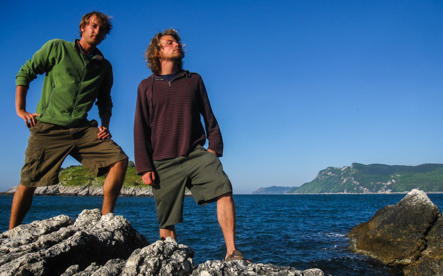
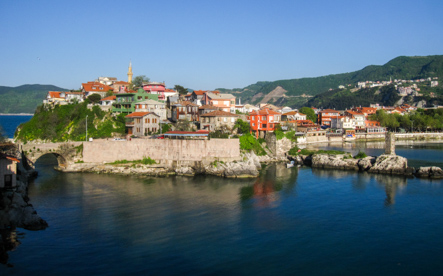
An early start the next day is our attempt to make it East, a few hundred kilometers, to Sinop, via a series of minibus hops. "Advisable to start early, else you may find yourself stuck in Inebolu, with no onward connections." Which is exactly what happens, as we wind along a gorgeous coastline at maybe 20km/hr, and so get to enjoy the hospitality of one of Inebolu's two hotels, where I suspect every backpacker that lands here has likewise missed the last bus (at 3:30, ridiculous).
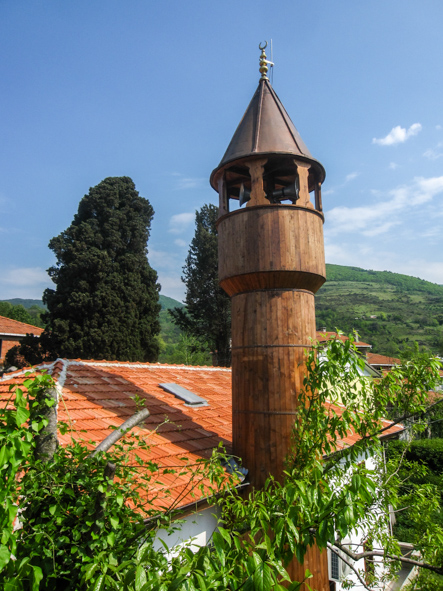
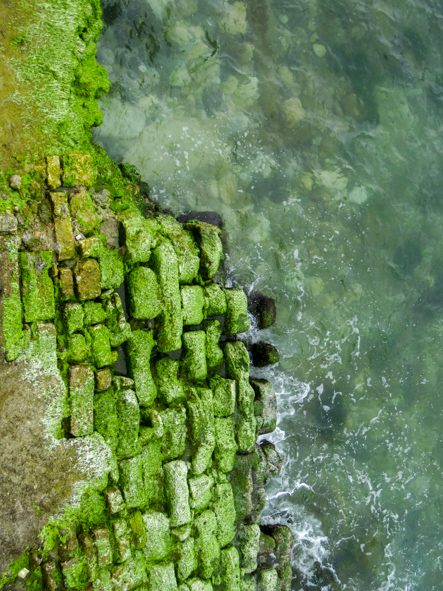
We make it to Sinop the next day, which is tourist central, with the town sprawled out on a bulging promontory with only a tenuous connection to the mainland. Some nice Roman (?) fortifications, falling into the sea. And yes, it is the sea, not the ocean as I often call it, and get shouted at each and every time.
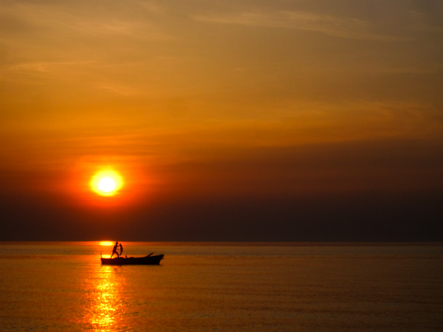
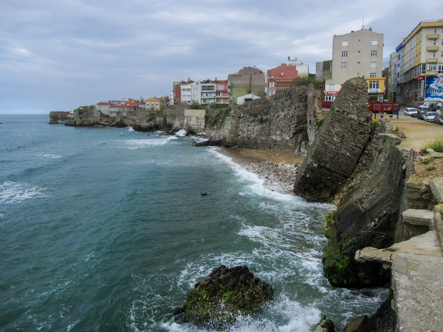
After a full day of wandering about Sinop we grab the last bus to Samsun, further Eastward, to await a midnight connection on to Trabzon – finally. We arrive in the morning, and bump into Dan who hops in our minibus from the bus station and joins the traveling crew. We make straight for the neighborhood known for prostitution – home of the cheapest hotels. We get shooed away from some, invited into others (which we steer clear of), and eventually land a room for just the right price. A nice little parade in Trabzon, Turkish banners flying, guys in uniform playing music, little school children singing, how nice.
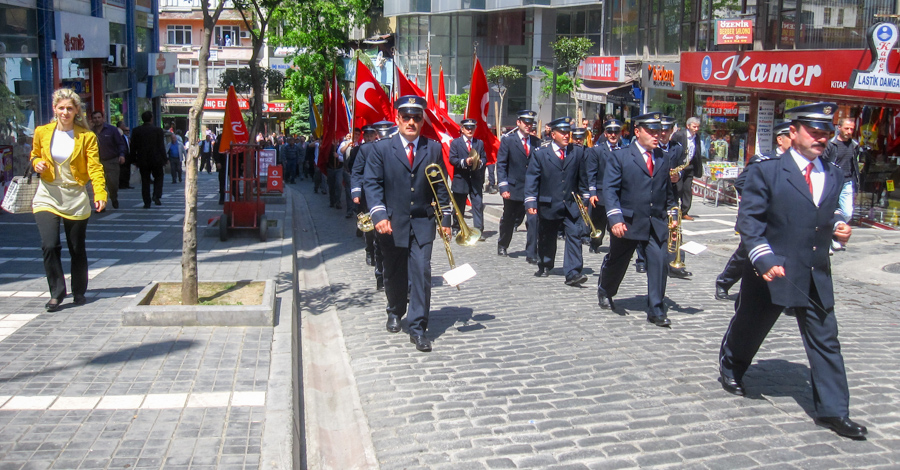
Frescoes and ceilings:
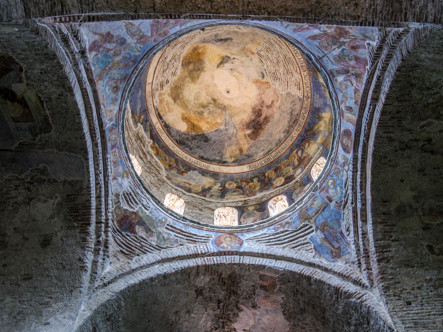

Other adventures include a failed attempt to locate attractive natasha's (Russian prostitutes), in a seedy bar by the port.
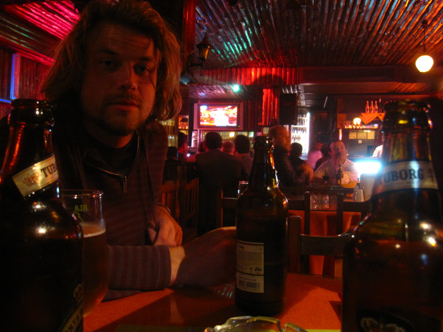
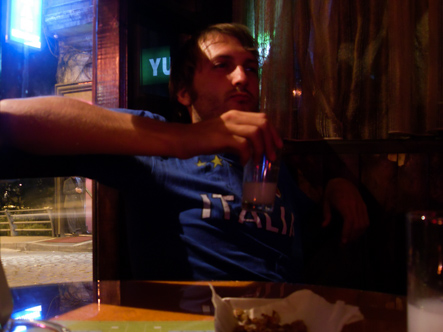
We do make it out to Sumela Monastery, a beautiful place in need of a bit of anti-grafitti efforts.
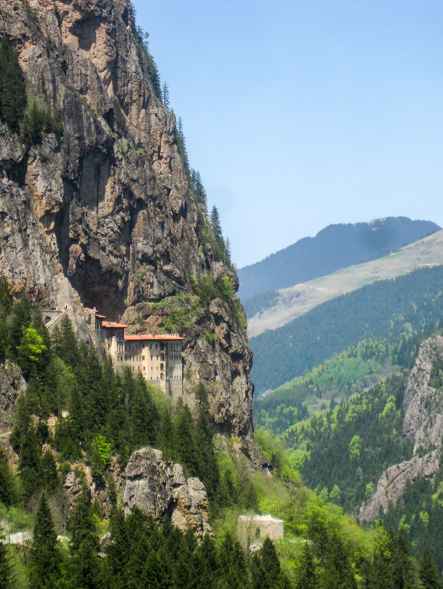
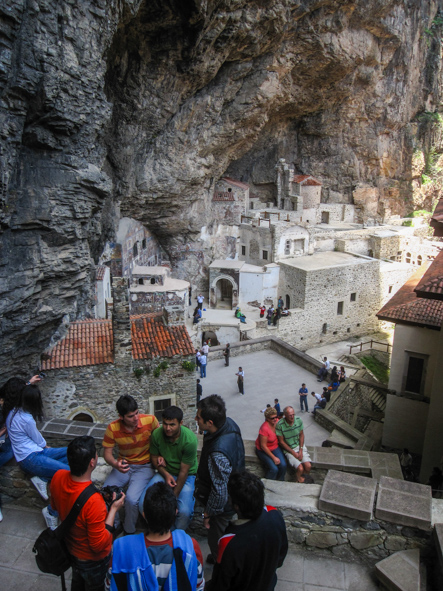
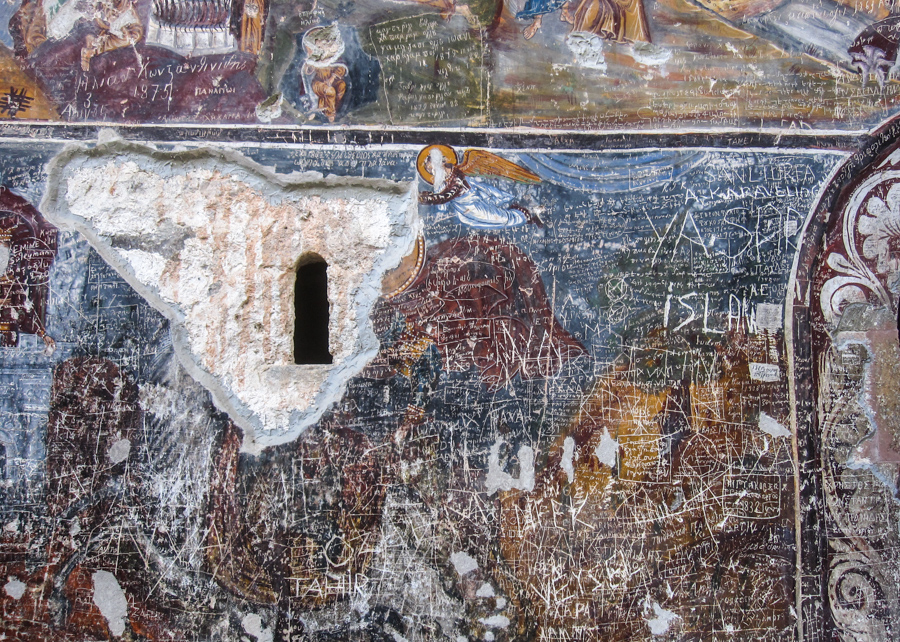
After a few days the three of us admit to the usual problem – no idea what we would do if we stayed longer. I debate with myself whether or not to join Bryn and Dan and head across the border into Georgia, formerly of the USSR. I finally decide to skip it, and instead will get on a bus headed back into central Turkey, and from there, go to catch the train to Cappadocia. This will get me, finally, back "on schedule" for the trip, which has been sliding slowly, week by week, behind.
I get the bus times for the next morning, set my alarm, and due to a rather un-mysterious sequence of events eventually miss it by about 10 minutes. And so, I change my mind and tell the guys that I'm coming with them to Georgia.
Georgia
on May. 17, 2009
Jumping on the bus from Trabzon up the coast to Batumi in Georgia we make the unexpected acquaintance of two Canadian sisters, who ditch halfway to go hiking in the Kashkar Mountains (Turkey), but promise to join us in Georgia soon. I've been assured that US citizens, among others, no longer need visas to enter Georgia, as of this year – the book says otherwise, and I am a bit apprehensive when we just show up. We pile out of the bus with all the locals (who have stocked up with, among other goodies, kilos and kilos of bread just on the Turkish side) and get in the queue, where a drop dead gorgeous and very Soviet-esque 20-something girl scans passports and administers stamps. In a very no nonsense, don't fuck around kind of way.
When we finally get to the front she asks if we've "filled out the form" (definitely not) and are promptly told to get out of her line and go find them. Which are under the control of another lady, who leaves us alone to fill them out (in Russian), which are about the Swine Flu? We're not quite sure, and when "done" we just leave them on the desk and get back in original line.
This time we answer yes to the form question (live and learn, just say yes – a good motto for Georgia) and are promptly stamped through. Everyone else from the bus is long gone, having acquired who knows what modes of transport onward, though the bus is right behind us and we are happy to hop back aboard. We spend the next 45 minutes dodging cows in the road. Cows seems to rule the roads in Western Georgia – cars come to screeching halts as they calmly wander about, staring sullenly at the intrusive, blasting a horn from a meter away, to no avail. The three of us agree that, already, we love Georgia.
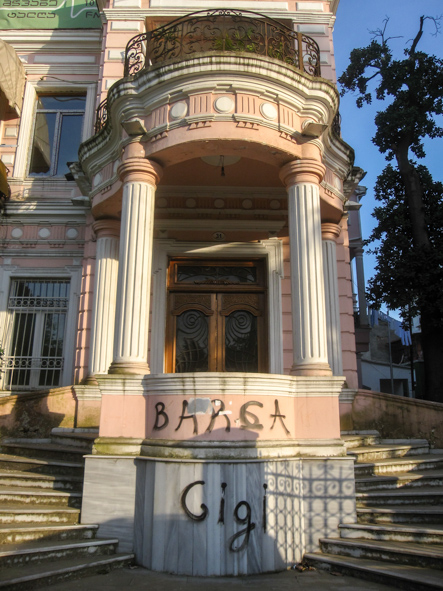
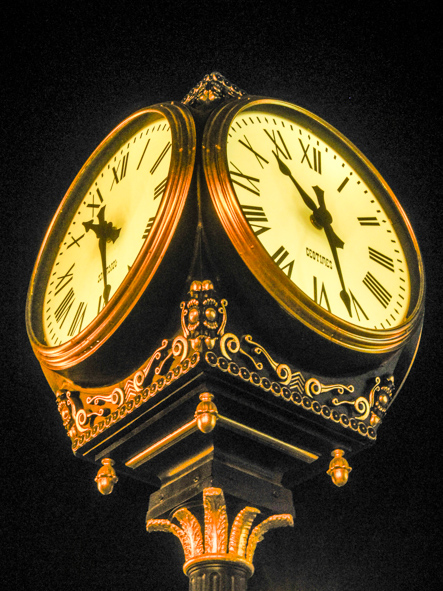
In Batumi we avoid any backpacker type joints and find the cheapest hotel we can. Which is a bit damp, no other way to describe it, but definitely the right price. Off exploring – the main attraction of Batumi is perhaps the ferris wheel, which we hold off on for tomorrow, and the fountains coordinated to a whole concert of music. My favorite was definitely when Blur came on.
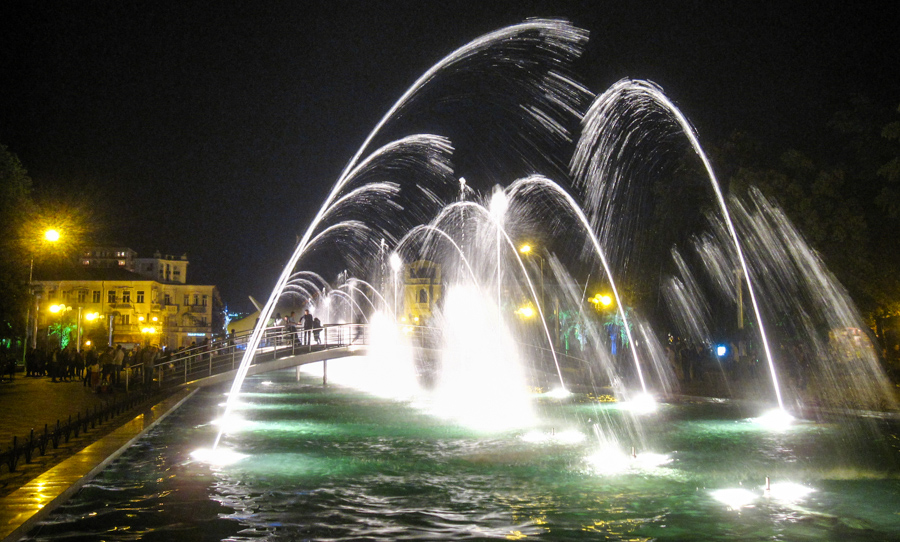
Batumi is apparently party central in the coming months, though at the moment all the beach bars and clubs are frantically under construction, and things are a bit quiet. Our second day we dedicate to laying in the sun on the beach and drinking Russian beer. A few hours into this strenuous exercise the two Canadians randomly walk up – having been called crazy for trying to hike at this time of year they bailed the next day straight to Batumi. The five of us make a ferris wheel date, which for some tragic reason isn't running this day, the saddest moment ever.
We make up for it by going for dinner. Welcome, my friends, to the wondrous marvel which is Хинка́ли, or khinkali.
These are enormous dumplings, the size of which we drastically underestimate and order enough food for about ten people. With stomachs about to explode we are interrupted by a merry old chap who arrives to our little zone (apparently dining out in Georgia is quite a private affair, if you don't get an individual room for your party you get a little area cordoned off with curtains) with a bottle of champagne and toasts us, Georgian style. That is, with a great many things said, and then the immediate consumption of all the alcohol in your glass. A bottle of champagne down, we are all invited downstairs to join their party (a birthday celebration), where all the younger relatives are dancing about while the whole family claps, drinks, and generally has a merry time. Dan about passes out from sunstroke/sunburn, while the rest of us consume an amazing amount of homemade [white] Georgia wine and make a pathetic attempt to match the amazing dancing of the kids. One of the guys, maybe a little younger than us, is in the national folk dancing troupe – really amazing.
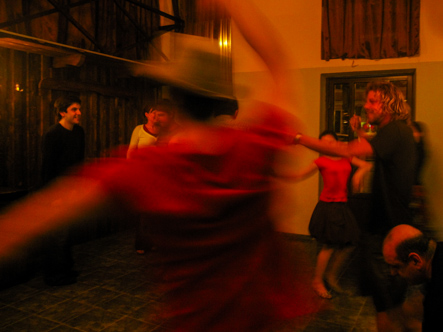
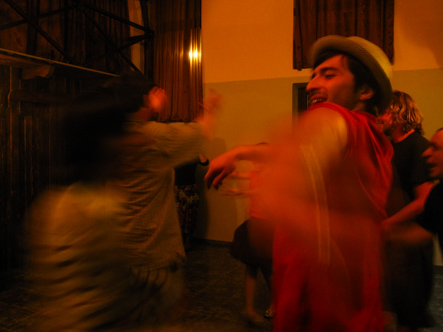
A late night leads to an early start, the next day, for Gori, in the middle of Georgia and most renowned for being the birthplace of Stalin. Featuring, among other things, a giant statue of Stalin in the main square, the Stalin museum (all in Russian, be forewarned), and the "original" house that Stalin was born in, preserved in situ.
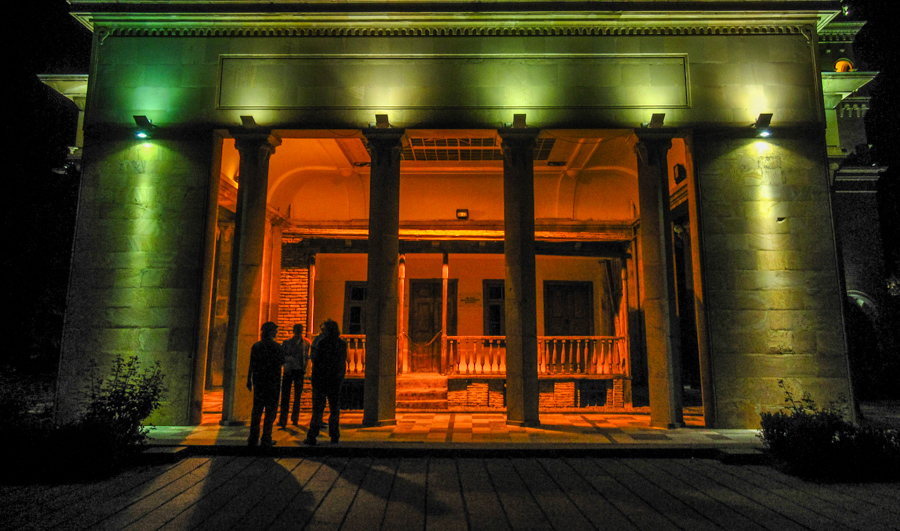
Our accommodation in Gori is our first experience with a Georgian homestay. It is listed in the book at 1 euro/night (prices have hardly gone up), and it takes us accosting a local, who proceeds to walk with us across town, to find the place. He knocks at the door, down the dusty side street of a dirty side street, neither with a name, and this old lady appears, speaking no English, seemingly unaware what three backpackers may be doing at her door. At this point, our guide has the most doubtful expression on his face, as in, you guys should get out of here, and at this point I am thinking the same thing. But a few seconds later we are waved inside the little family compound – one of the strangest places I've managed to spend a few nights.
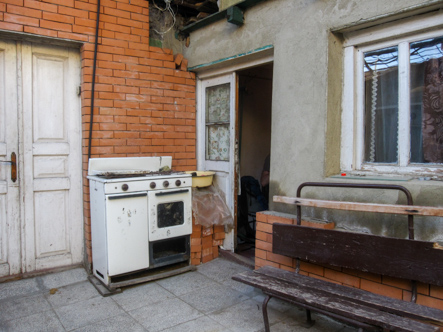
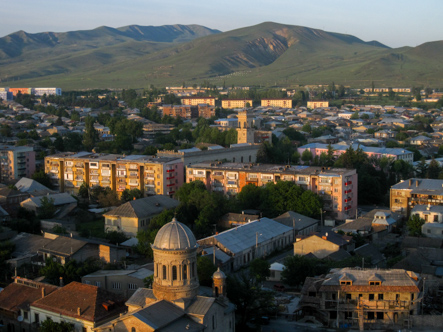
In Gori we meet up with the first of two Georgia friends that Bryn met in Cairo – Data. We spend the next few days hanging out with all his friends in Gori, enjoying their amazing hospitality. A phenomenon we first discovered in Syria, it seems that whenever someone becomes your host all their other duties in the world cease to exist, something I will have to try to emulate.
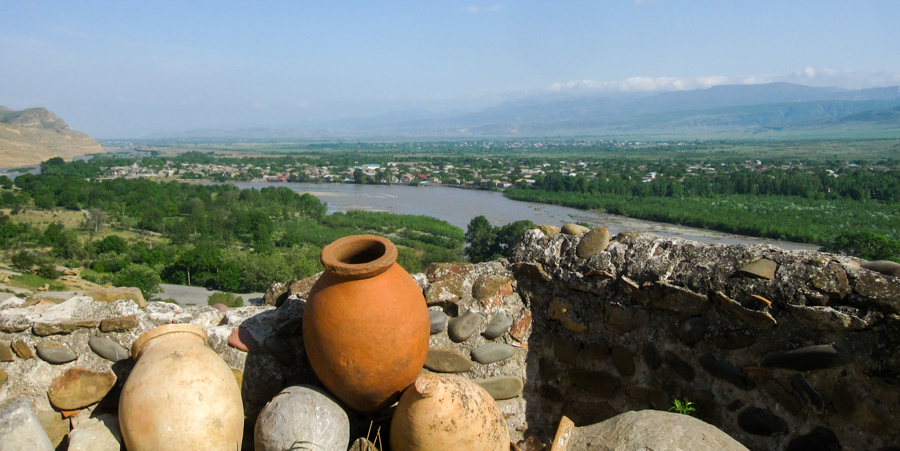
After much too long, or much too short, in Gori, we make our way to the capital, Tbilisi, where a general sense of angst has been ongoing for quite some time now (my new found source for all kinds of crazy news from Central Asia). Protestors, living in little plywood and plastic "cells", have completely blocked off the main street downtown running in front of parliament. We are told that there are nightly police raids through the protester's camp to scare people, and that big plans are afoot for independence day, only a few days ahead.
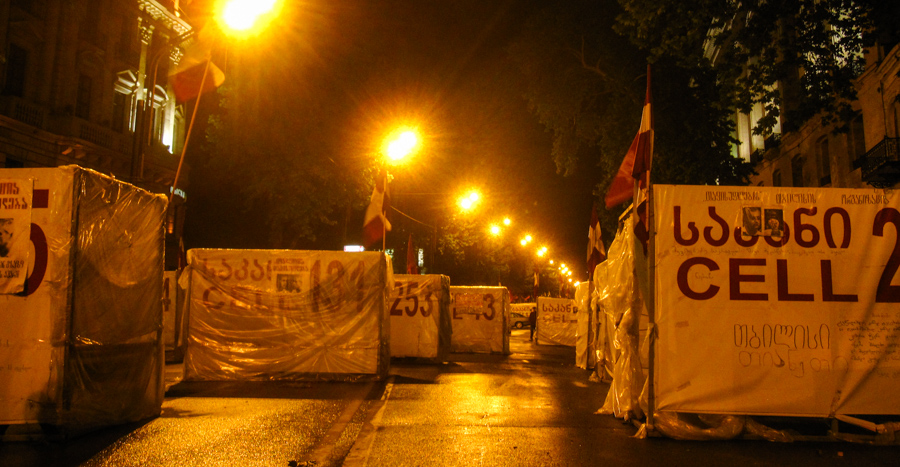
They are demanding the resignation of the president, for, among other things, his mistreatment of the Russian invasion, and suspicions over a tank battalion mutiny (...) which has apparently happened just a few days before we arrived. With this in mind, we expected Tbilisi to be a rather lively place, but things were, sadly, rather under control, at least on the surface.
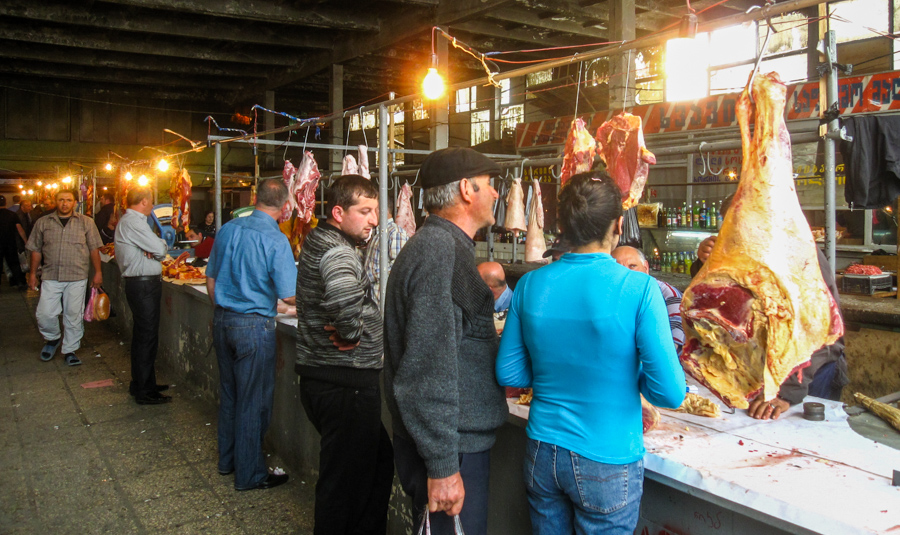
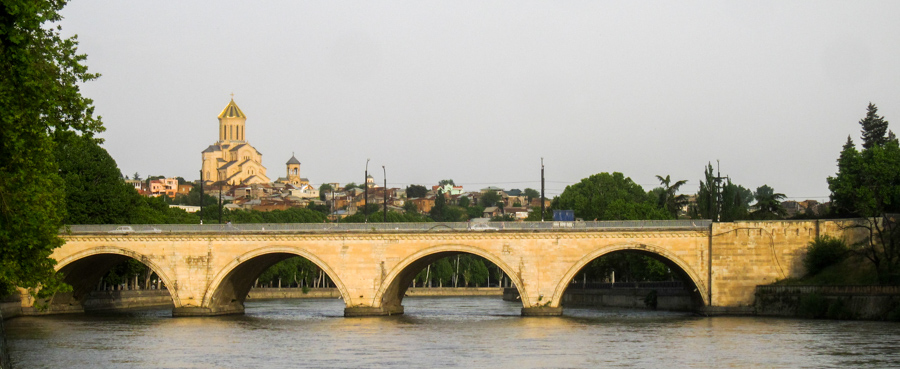
A few drizzly afternoons, and overlooking the city.
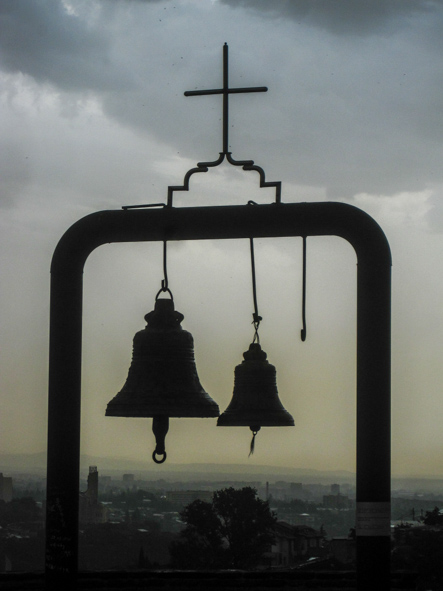
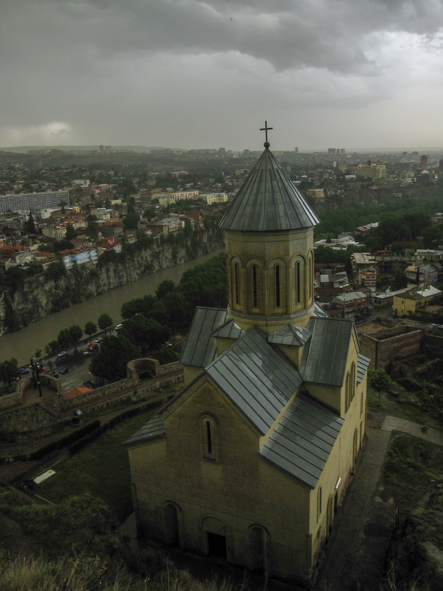
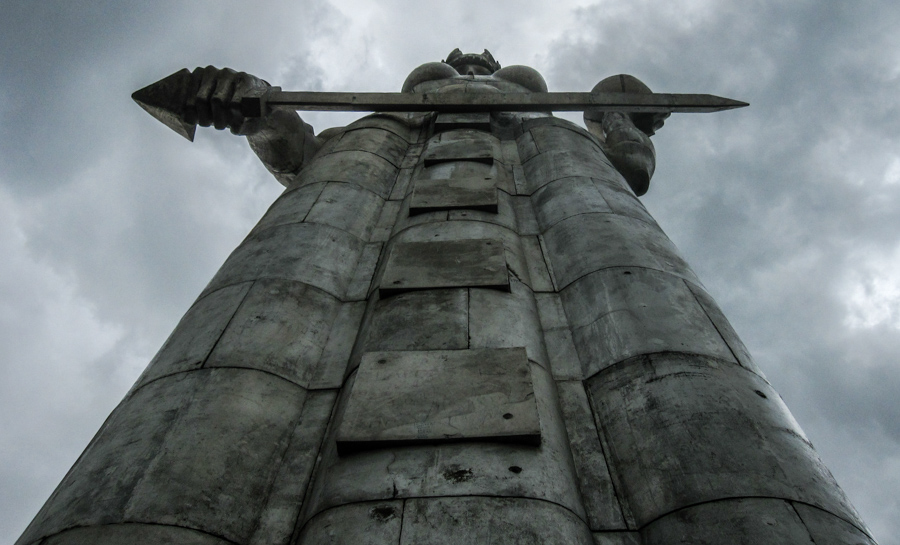
250 million rubles? Not bad.
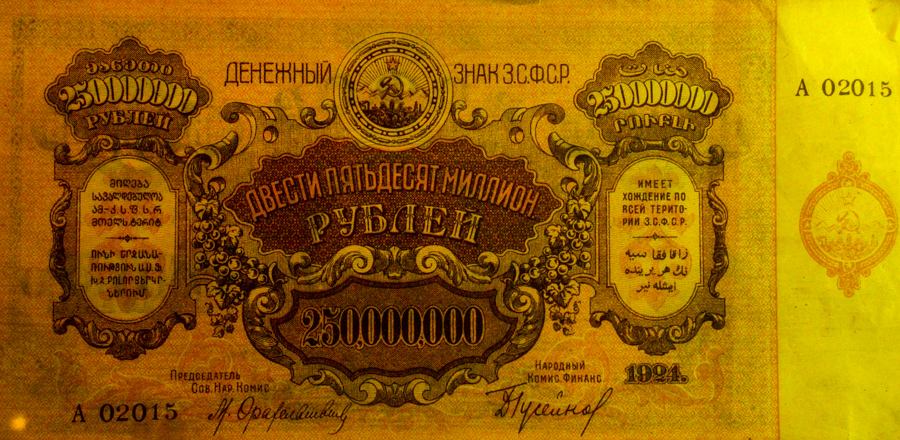
At the insistence of our Georgian hosts we make a trip South to the Davit Gareja Monastery, a beautiful place in an "arid lunar landscape" sitting on the border with Azerbaijan, a country looking all the more tempting. A journey which involves chartering ourselves a private taxi for an hour ride from the closest bus stop for a negotiated price which our driver agrees to all too quickly – even if he does sit around waiting us for hours.
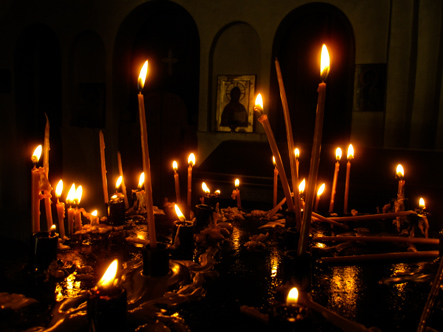
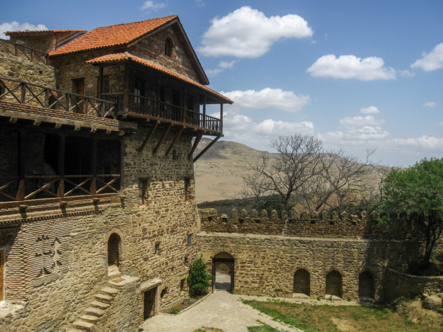
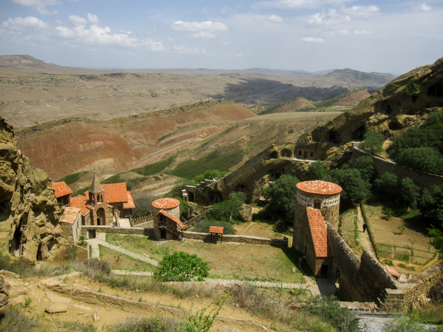
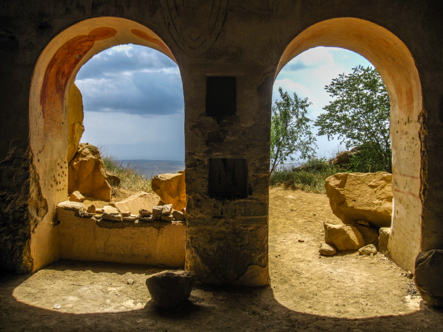
Two wanderers, gazing into Azerbaijan.
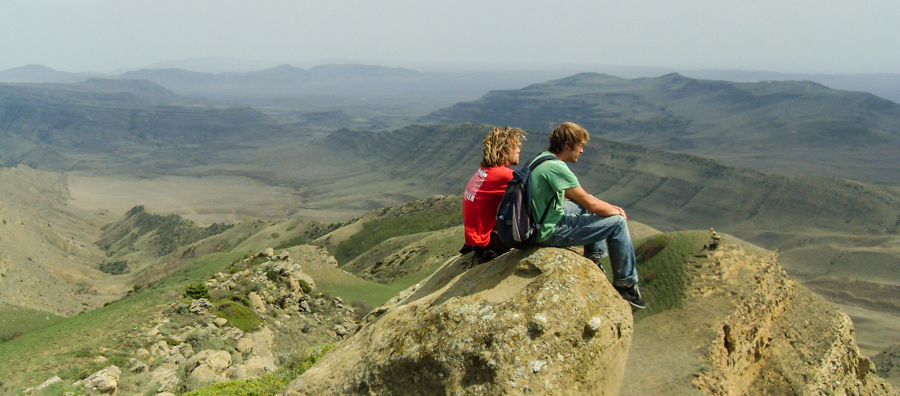
We meet up with Bryn's second friend from Cairo – Tato (same name, different Tato), who is (a) somewhat a celebrity in Georgia, having been a star on the first ever Georgian reality show, something akin to Big Brother, and (b) the manager of one of the Khidi nightclub in Tbilisi, which is conveniently having a bit of an event, which we get some invites to. Complete with a VIP table upstairs. It's underneath the Vakhushti Bagrationi Bridge, and we walk through a rainstorm to get there, the hours of dancing eventually drying us off. Not too shabby at all. A night which doesn't end until the sun is peeking back over the horizon.
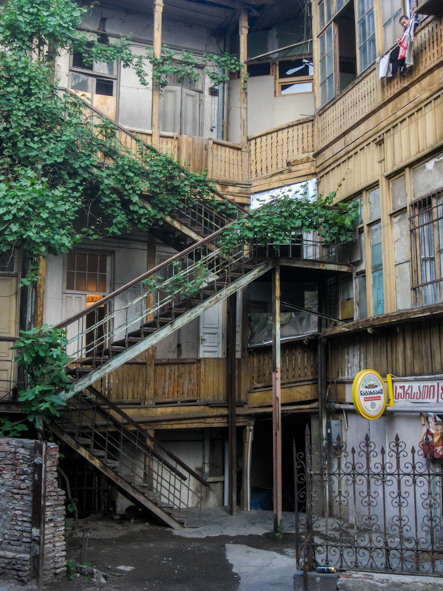
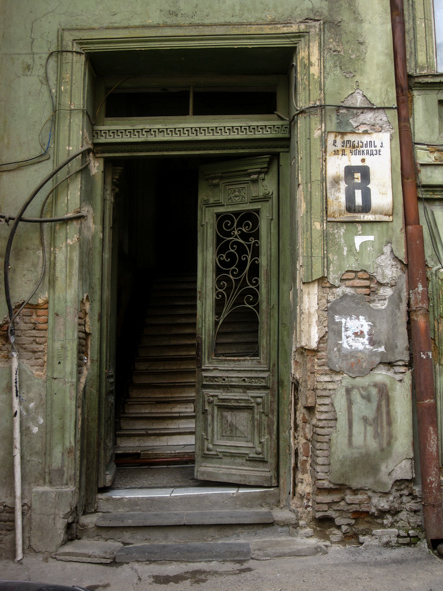
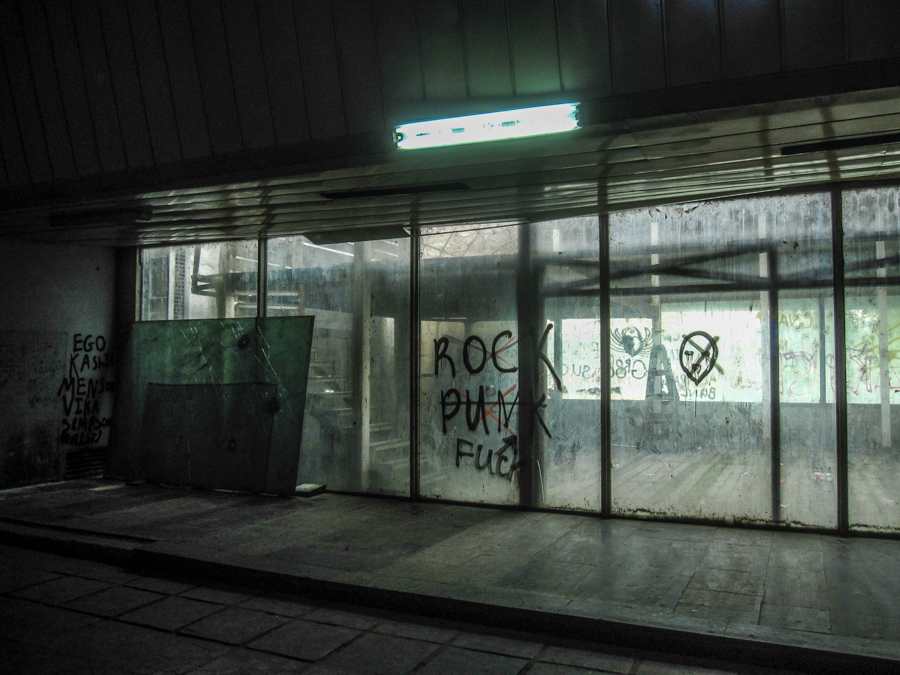
Our sightseeing the next day (feeling a bit bad that we haven't actually seen that much of the city) includes abandoned underground stations, and what appears to be baptism day at the local cathedral.
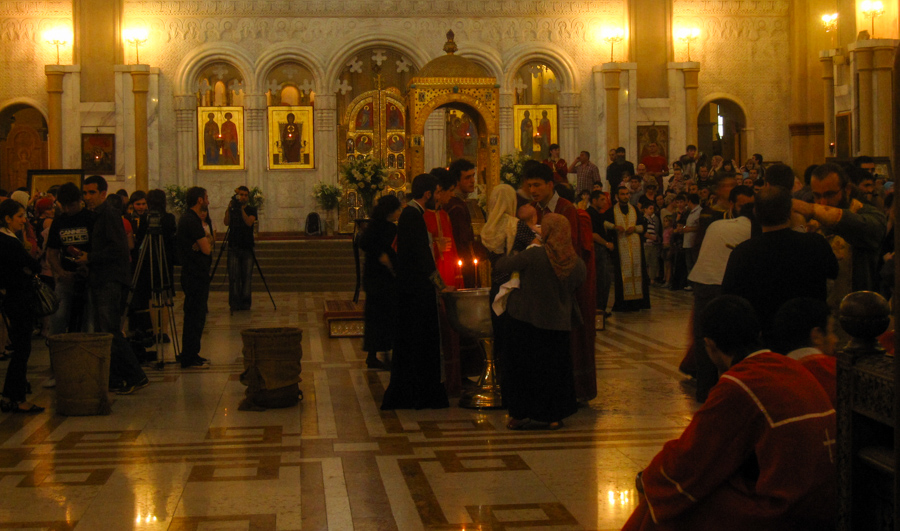
Among other curiosities, such as the availability of kachapuri (cheese or meat, flaky pastries) for breakfast, and nothing else, are the ubiquitous seedy casinos everywhere. Georgian script is crazy! As I don't know the sound of a single symbol, finding the right metro exit is a nerve wracking experience. Much harder than Cryllic. Perhaps similar to Arabic, or Thai in difficulty?
Georgia has convinced me of four things: that the people are amazingly welcoming, that things are exceedingly cheap, that girls from this part of the world are astonishingly beautiful, and that I definitely need to learn Russian.
My first taste of the ex-USSR is quite satisfying.
Turkey :: Central Anatolia
on May. 26, 2009
I ditch the duo who are headed up into the mountains (next time!) and catch a bus back across the border in to Turkey. Based on the surprised faces at the little village where I switch microbuses, this route is not on the tourist trail. I make one, of very few, loops on this trip, arriving back directly to Kars. The gentleman at my old haunt happily provides accommodation for the night while I wait for the 8am the next day. How could I come to Turkey and not ride on the famed (or, rather, ill-famed) train? In just shy of 30 hours (oh yes, indeed) it deposits me in Kayseri, only a short hop from my return to tourist central – Cappadocia (Kapadokya). The landscape is worth it.
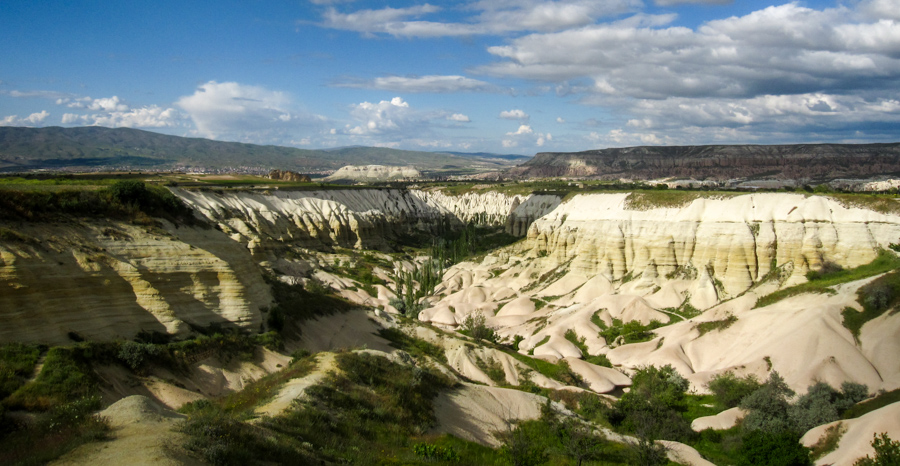
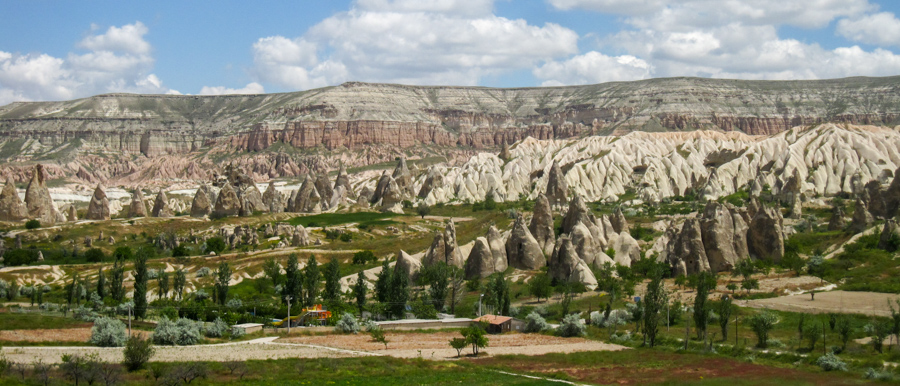
I shack up in a rooftop dorm room in Göreme for a few days to check out the area. The surrounding countryside is perfect for hiking, crisscrossed with valleys, crazy rock formations, ancient rock cities and monasteries, and a spread of blooming flowers courtesy of spring. It all feels a bit like Dahab though, backpacker central, full of small cafes and bars, plenty of room for the ambiguous lounging.
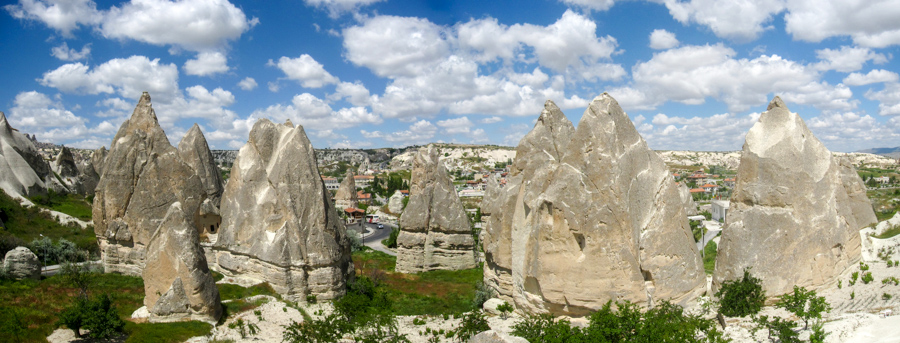
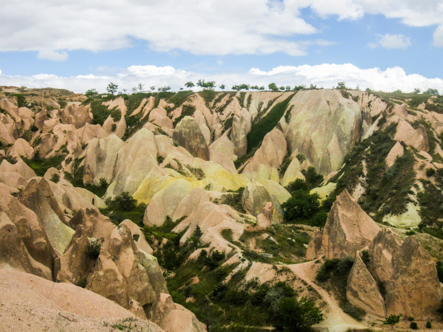
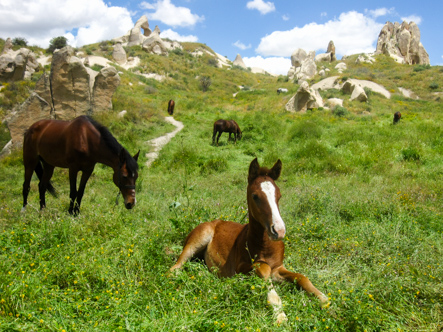
The Göreme Open Air Museum is a small area full of rock-cut churches and houses, "fairy chimneys," and the occasional cave monastery. I spend all my time hiking around a maze of interconnected valleys with such delightful names as Rock Valley, Pigeon Valley, Baglidere Valley, Zemi Valley, and Rose Valley.
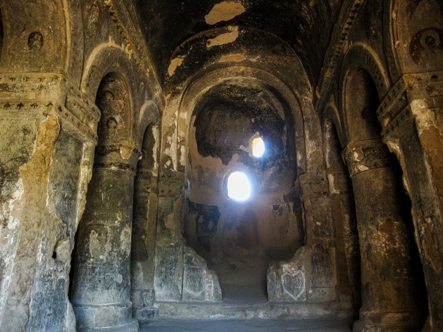
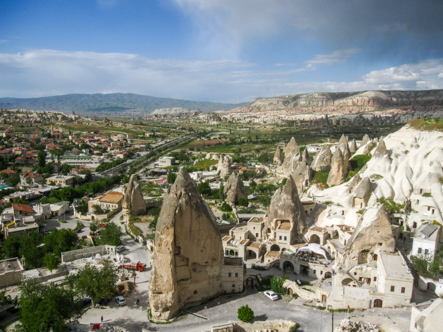
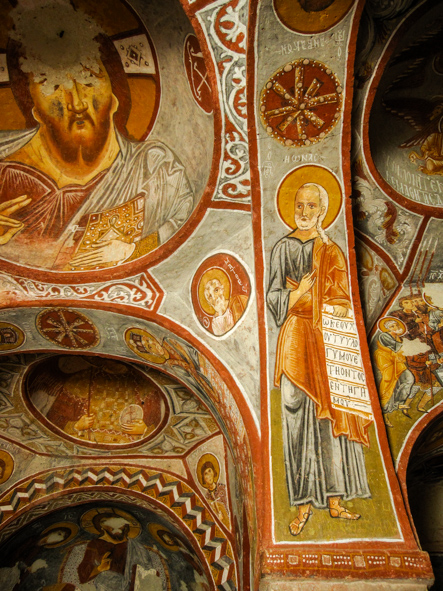
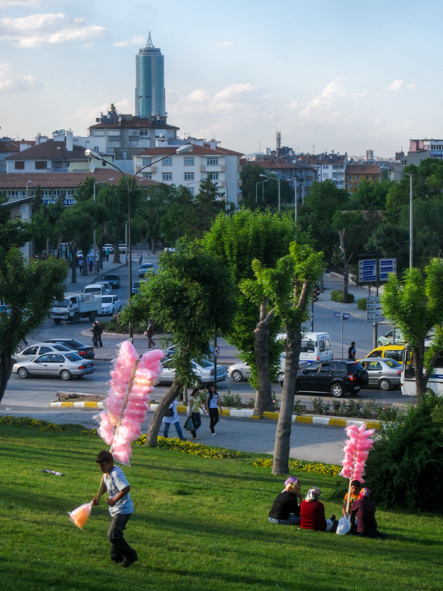
Someone told me about a hike through Ihlara valley to the south and I manage to make it down via Aksaray. I drop my bags at a little pension in Ihlara, manage to catch the last bus up to Selime at the other end of the valley, and hike back the 14km before sunset. What an awesome hike, with a curious little segment in the middle where all the tour buses come for the "day trip" hikes. The vast majority of it I see more locals than hikers though, as the trail follows a river alongside farmland and orchards.
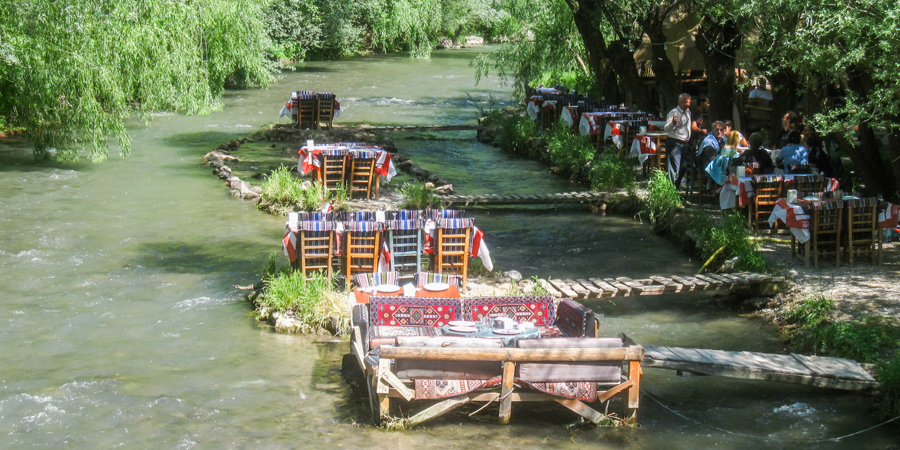
The next day I get an early start out towards Konya, renowned for its conservatism and the heart of Sufism, ala Mevlana, Mystics, and the Whirling Dervishes. I never knew that the reason they twirled was because they believe the dizzying sensation itself brings them closer to something / is a sort of religious experience. A very cool ceremony, with mostly middle aged men, though also younger boys in training and a duo of elders in the lead.
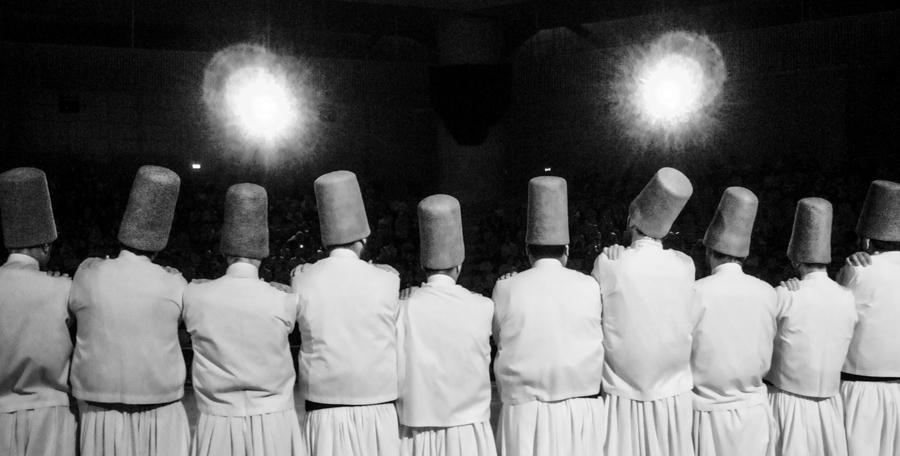
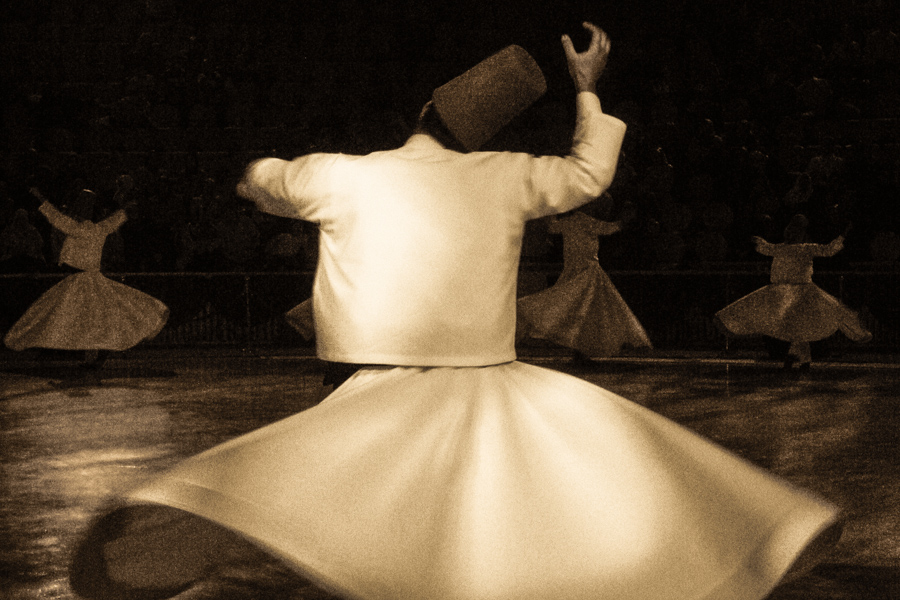
Although I am perpetually behind schedule I can't help but make yet one more stop before reaching the coast – Lake Egirdir.
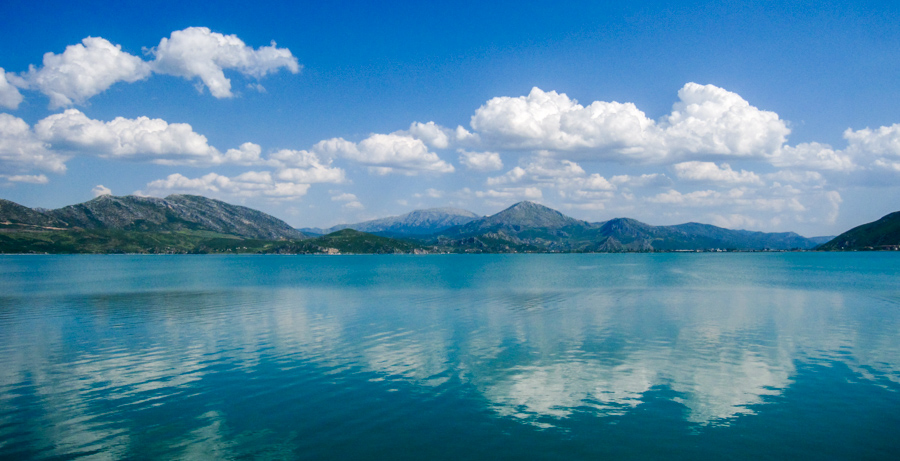
Jutting out into the blue lake is the majority of town sits on a awkward little promontory. Definitely a place to come and relax – my hostel has a unobstructed balcony looking straight towards sunset and a staircase straight down to the beach.
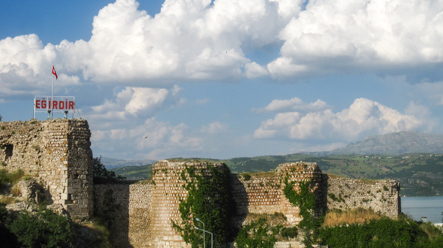
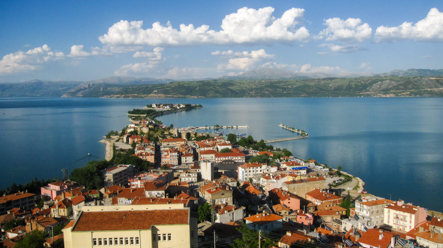
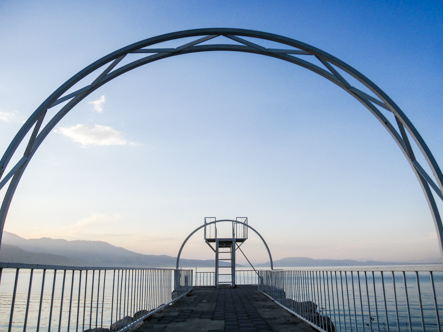
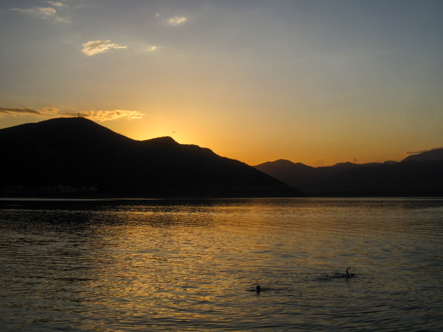
Perfect for sunset swims.
Turkey :: The Coast & The West
on June. 1, 2009
From Egirdir I make my way to Antalya, jumping off point for the Turkish coast. Headed to the old center I hop off our big bus with a few locals and pile into a little minitaxi provided by the bus company to get us into town. The driver winds through narrow streets and backyard orchards on a route which I doubt is the most direct. We pull up to some house where he starts honking madly – a package pickup in the middle of his run. To satiate us he jumps out and picks a few handfuls of orange-esque fruits from a tree and hands them around to all his passengers. Can't complain.
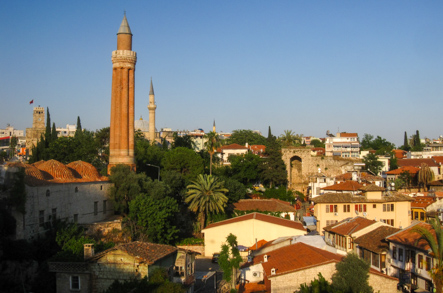
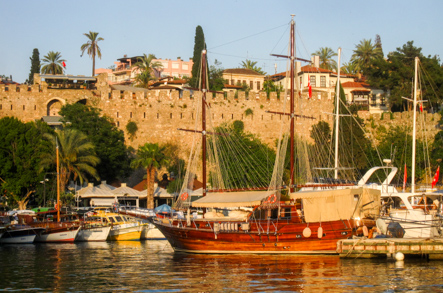
Antalya itself is not too impressive – a return to tourist central, especially filled with Russians. I stay only a day before heading down the coast to Olympos, of backpacker fame. Olympos sounds more like a resting place for the gods, and there are some impressive Roman ruins, as well as the eternal flames at Chimera. But the main draw is the string of hostels and a stretch of gorgeous beach. I forgo the party destinations and end up at Saban Pension, where the mom cooks us a feast every night – some of the best food of this entire trip. My days are spent lying in the hammocks, lounging on pillows in the orchards, reading, sunbathing, and swimming in the ocean. Including a sunrise swim which I am surprised myself by making it to.
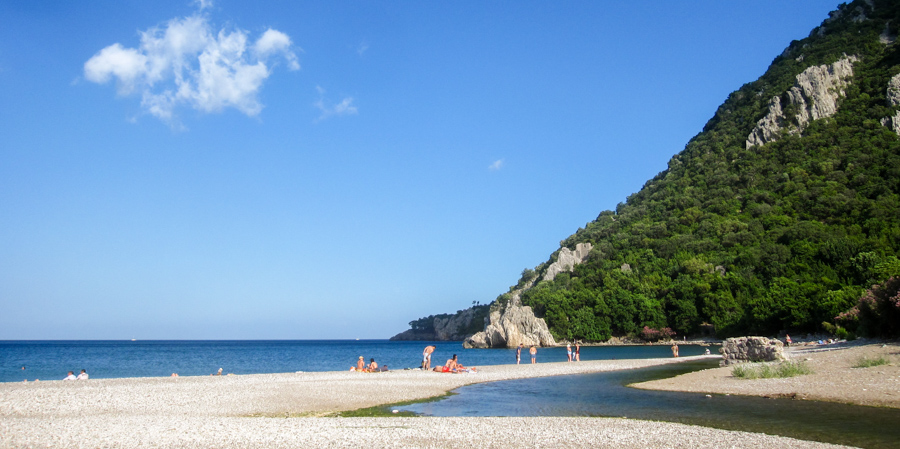
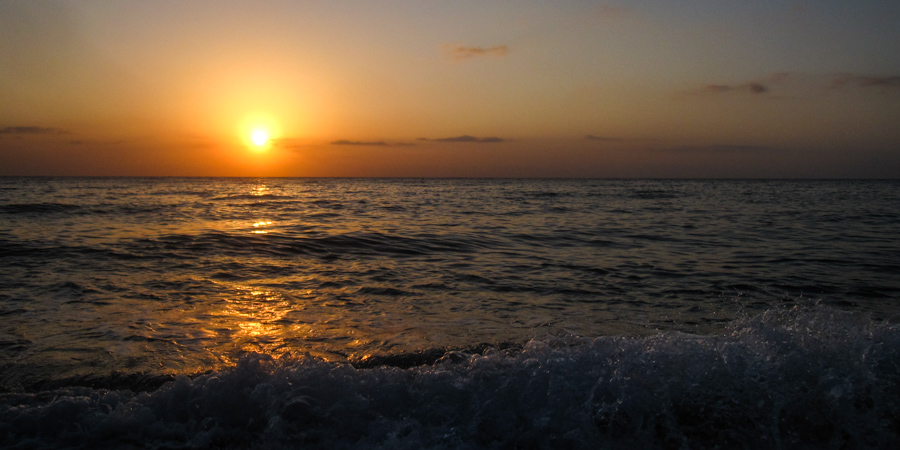
For the next two weeks I manage to swim in the ocean every day. I would love to live on the coast.
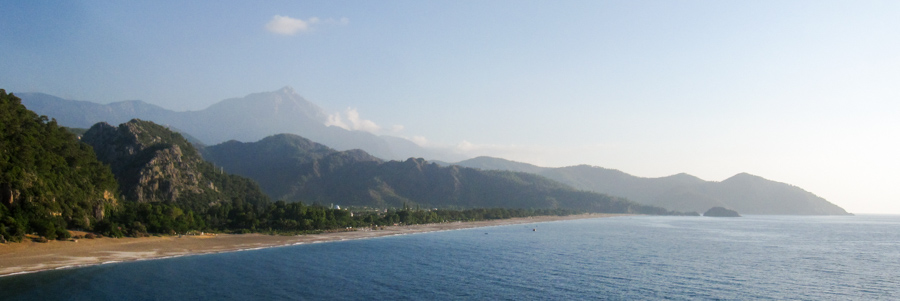
When it is finally time to say goodbye I am on to Kas, and wish I would have stayed a bit more in Olympos. I am city hoping, though why I am not quite sure.
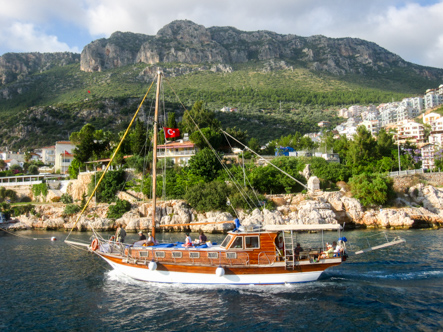
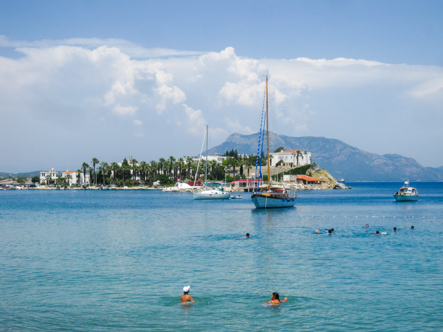
Quickly on to Patara, site of some amazing ruins of Lycia, and also Turkey's only (?) real sand beach, 13km long of pure beauty. I spent a few days. I don't accomplish much.
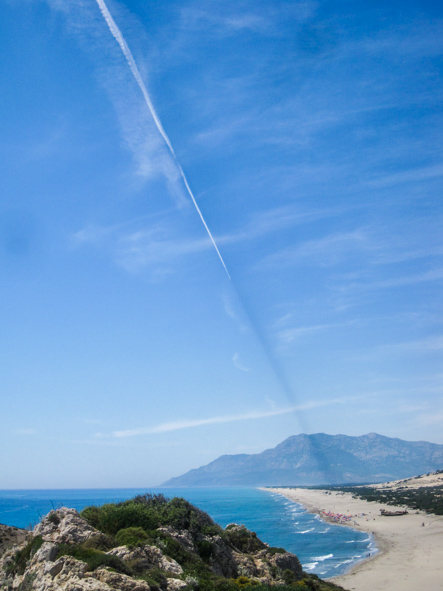
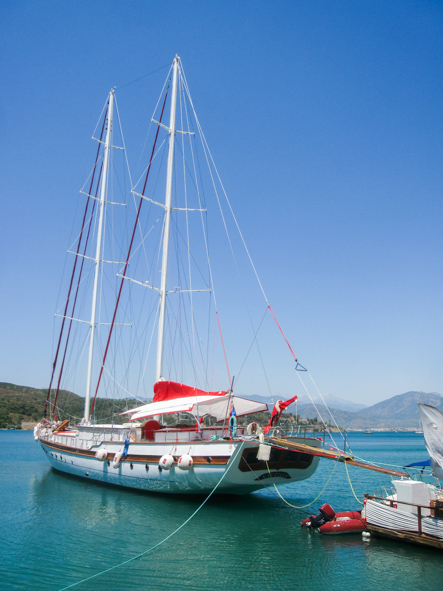
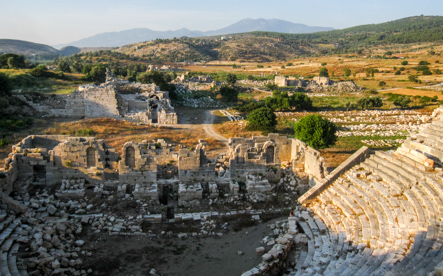
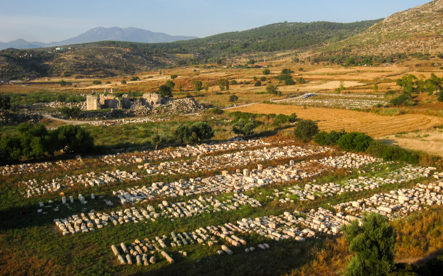
On to Fethiye, renowned for its over density of British vacationers. A few fun nights, one with a 200 euro bar tab (between three of us, and totally not my fault), and a gorgeous view from the rooftop dorm room.
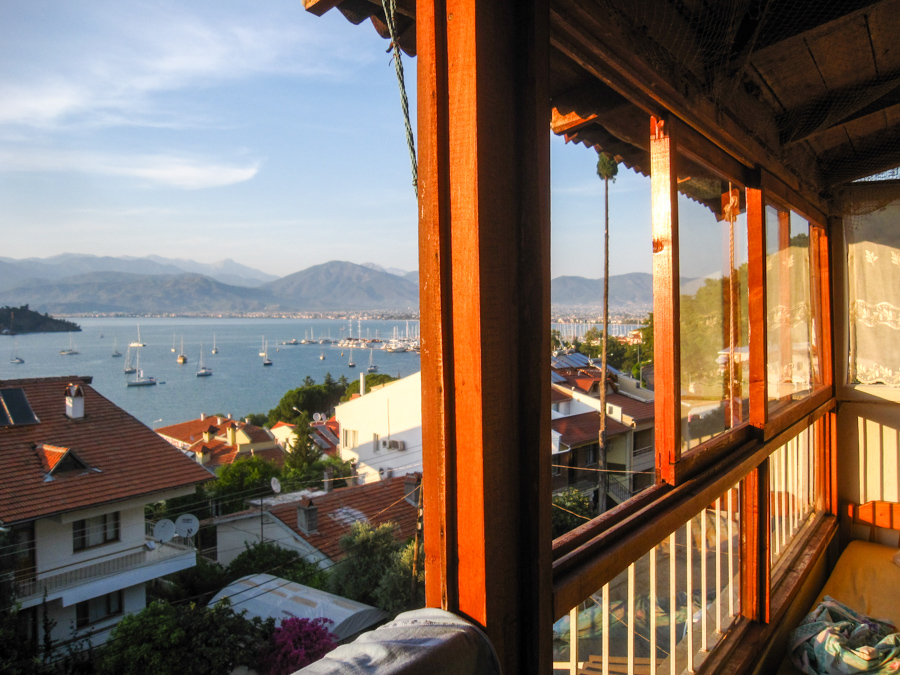

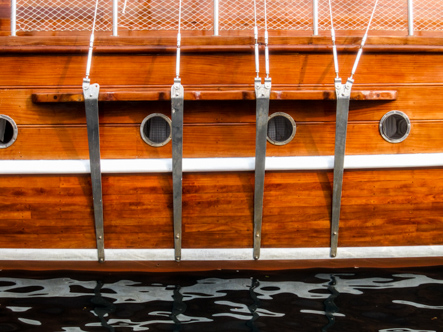
Next to Marmaris, full of Ukranian and Russian tourists.
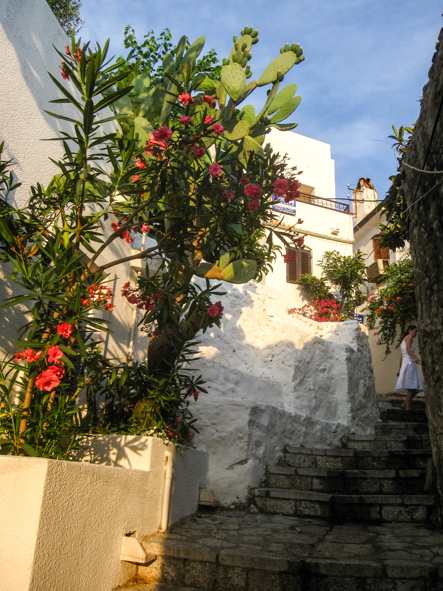
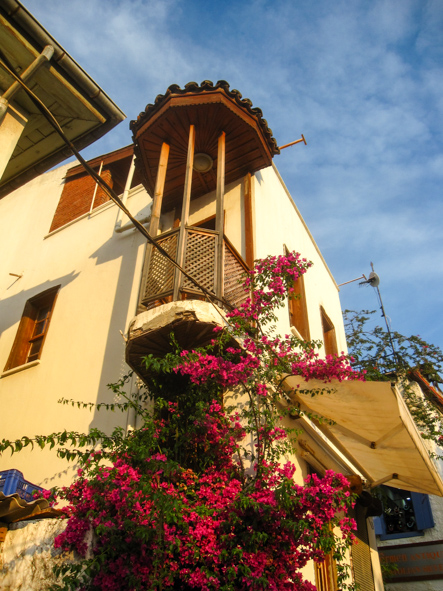
The guys work on their suntan the "Russian way," standing, speedos bunched up as small as possible, rotating slowly. After someone points it out to me I can't help but notice everyone. Also, a fair percentage of ladies no longer feeling the need for their tops. I think I am as shocked as any of the locals, coming from the east.
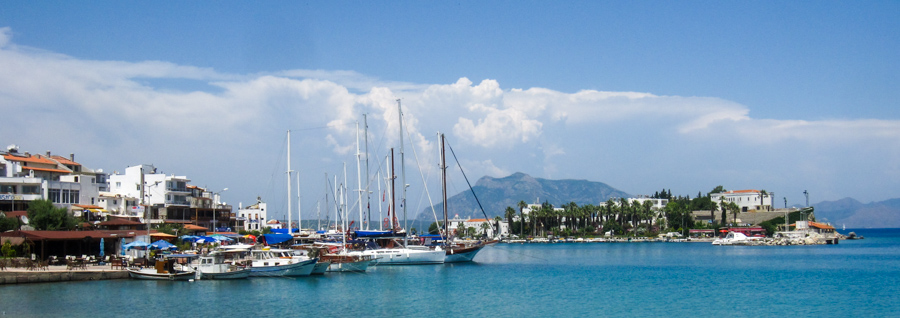
Marmaris is a big city without much charm, but I catch a little bus out to Datca on the peninsula, where I wouldn't have minded staying a few more days.
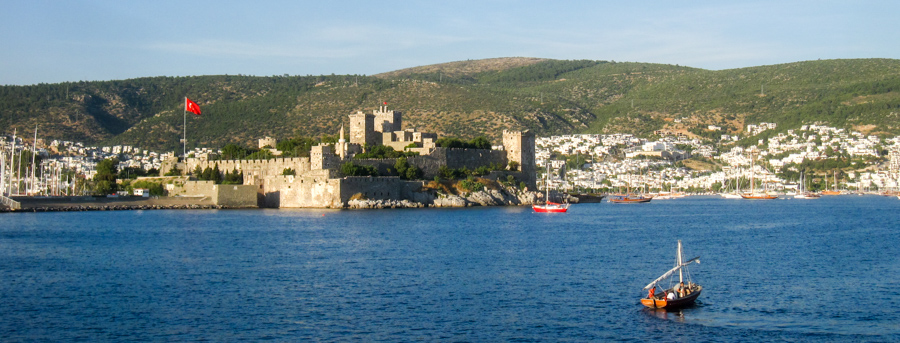
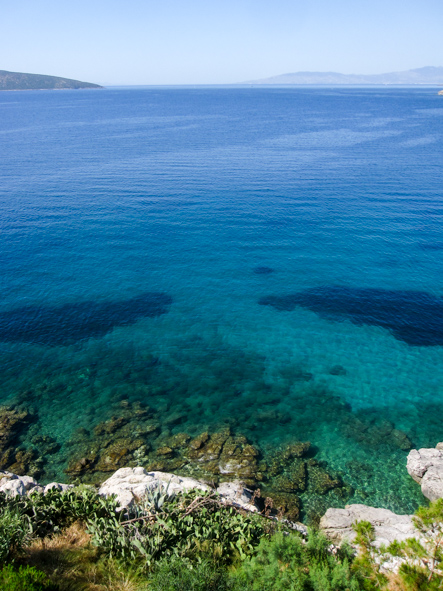
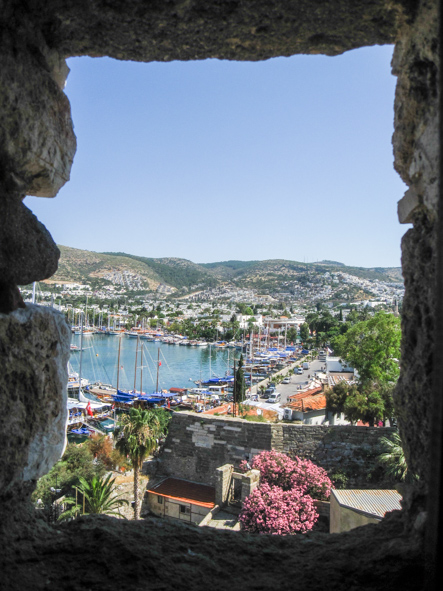
The ferry takes me across to Bodrum, party central, home to Bodrum Castle, built during the Crusades. And, also, Halikarnas, the "loudest disco on the Med." On the quieter side of the harbor, a sponge vendor.
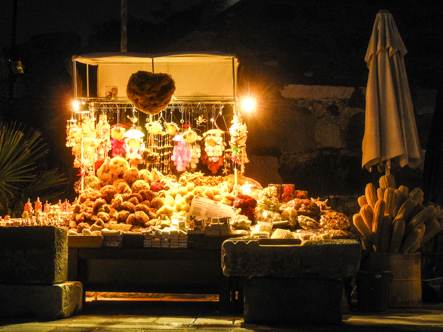
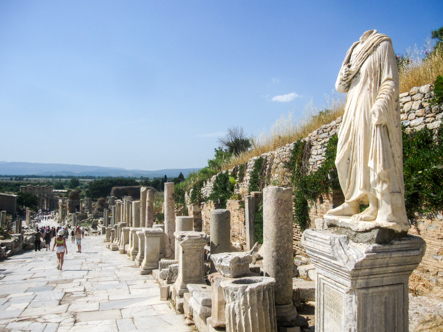
From Bodrum I head inland, forgoing Pamukkale (not worth it I've been repeatedly told), and landing at the ancient Roman city of Ephesus (Efes). There are a handful of hostels in town and all seem pretty fun. The ruins themselves are amazing, the main marble boulevard leading up to the library, and the immense theater.
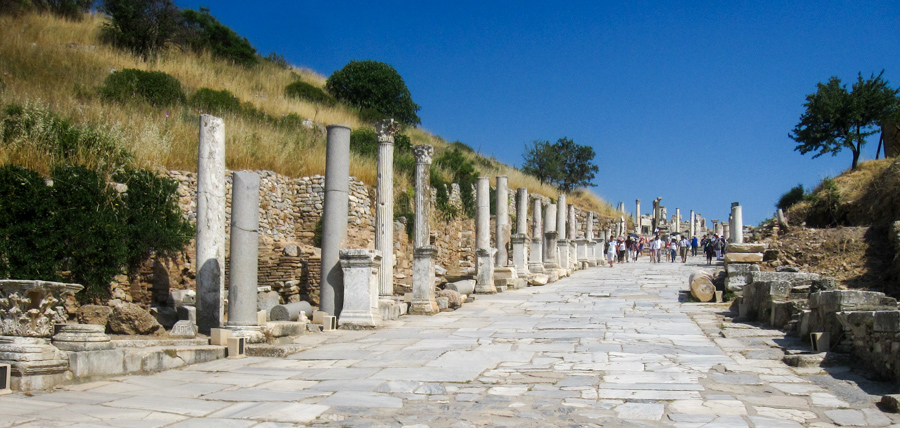
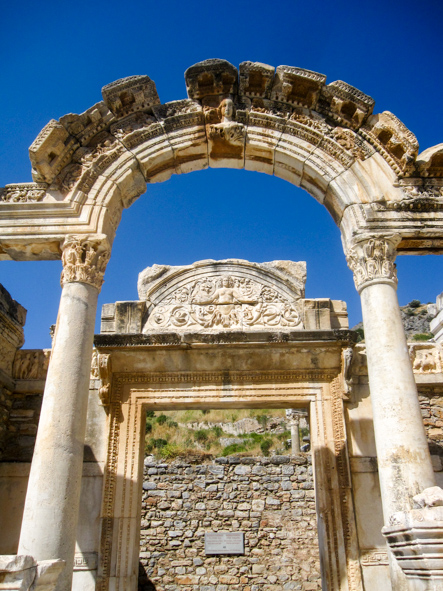

Spoiled only slightly by the hordes of European tourists in bright pastel tank tops crowding after tour guides. Still, the place clears out near sunset, and it is easy to see how this city was second only to Rome.
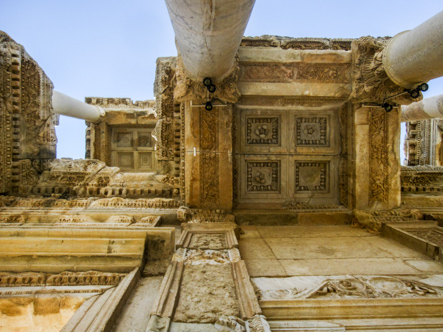
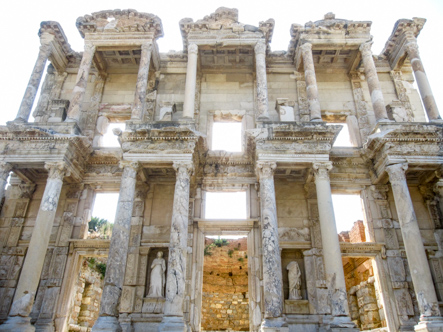
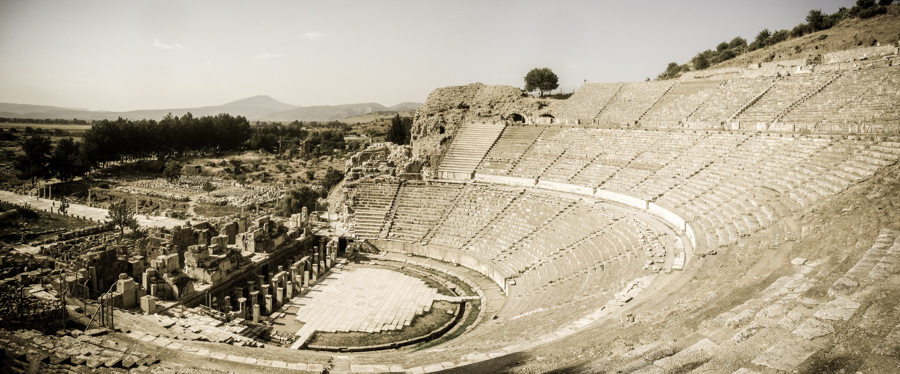
Not quite content to hit the west in one step, I make a midway stop at Bergama. The ancient city of Pergamon lords over, and the Sanctuary of Asclepius (awesome underground tunnel) is nearby, as is the massive "Red Basilica." The redeeming feature of the guesthouse I stay at is the library, which provides me with a hardcover Isaac Asimov anthology which I carry with me until the end of the trip.

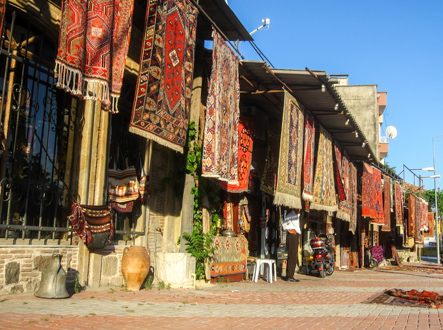
The last stop I want to make is Troy, even though I've heard all the fuss about the ruins, not impressive, not well excavated, potentially not even Troy etc. It is nearly to Canakkale, my stop for the night, but if I have to go and then make the small trip back I'll never make it in time. Instead, I take a tip and ask the bus driver to let me off at Truya, which he happily does, big backpack and all, whereupon I discover the 5km walk from the highway to the site. Which, an hour later in the hot sun, was just as rough as I had expected it to be. The guards take pity on me at the site, I stash my backpack and look around. A giant replica of the wooden horse, tacky. The best pictures I take are of an awning covering the ruins and of a friendly cat. Still, with a little imagination. I join a bunch of workers from a nearby restaurant who all head back into town in a little shuttle, their work done for the day.
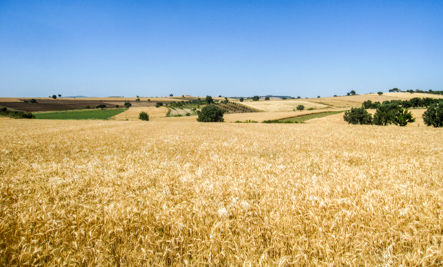
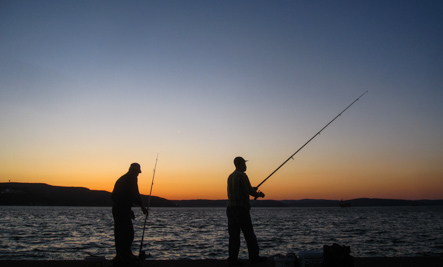
My first view of the Dardanelles. A waterway whose importance has been impressed upon me by Orpan Pamuk. One night only – I'm not here for Gallipoli, the main attraction, as are all the Aussies and Kiwis that fill the hostels. Tomorrow morning, bright and early, to Istanbul.
Turkey :: Istanbul
on June. 15, 2009
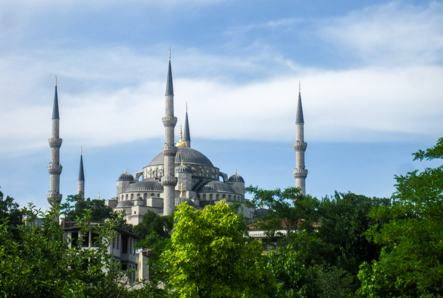
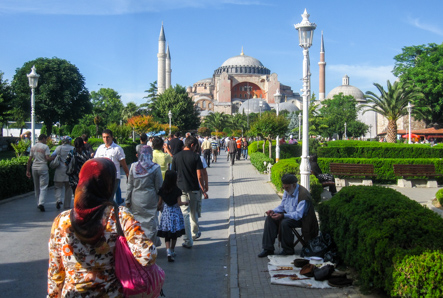
Istanbul (previously Byzantium and Constantinople, now fifth largest city in the world) is a whirlwind of sight and sound that I immerse myself in for little more than a week, though I could have stayed so much longer.
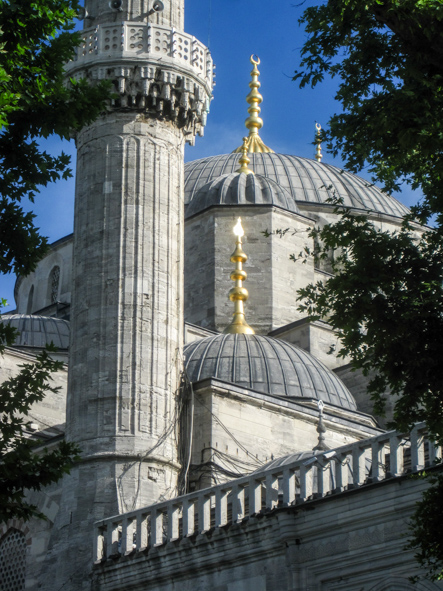
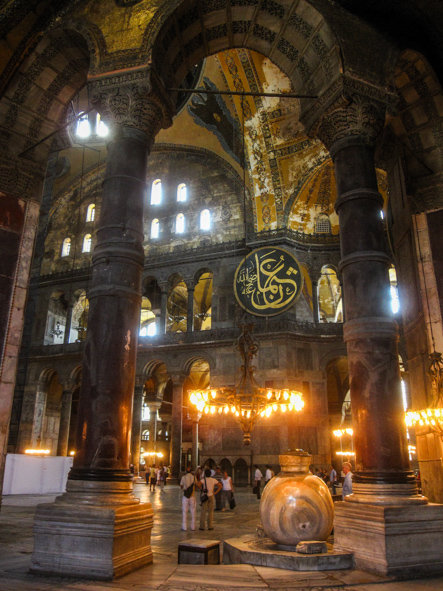
A series of snapshots. I take lodging in the heart of Sultanahmet, where the majority of the hostels are, the classical tourist sights, and everything that is wrong with Istanbul. But also some of the most beautiful parts. At some point I brave the crowds at the Hagia Sophia (Aya Sofya), which looks a bit squat and ugly from the outside but is unbelievable from within.
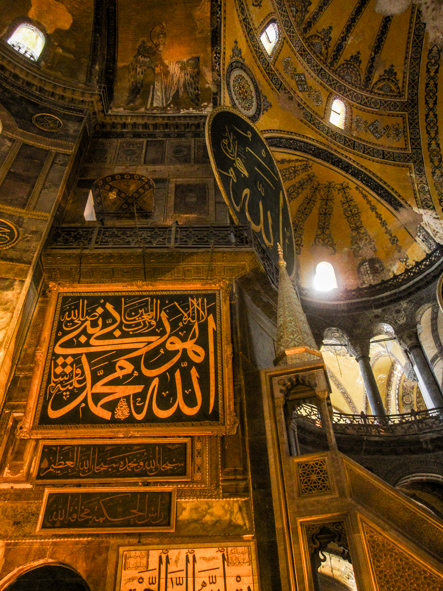
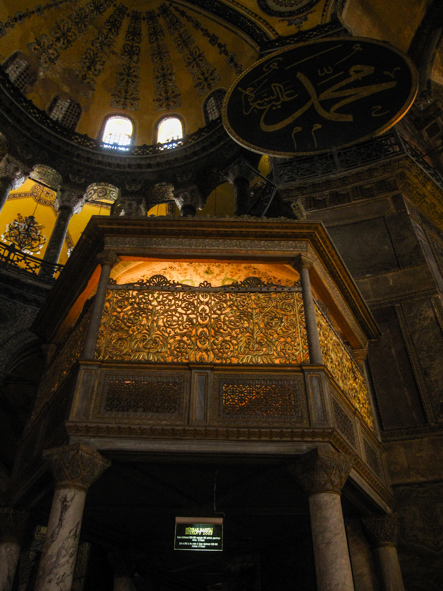
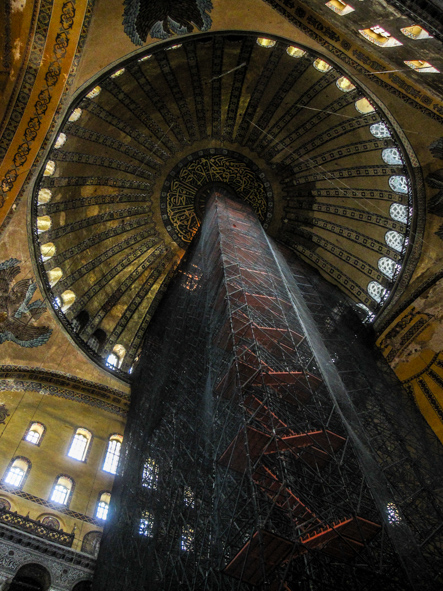
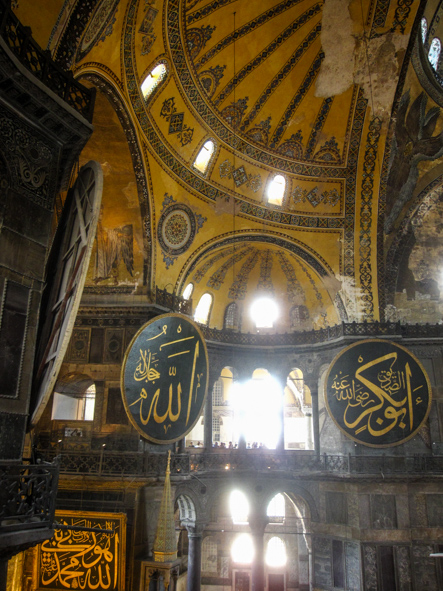
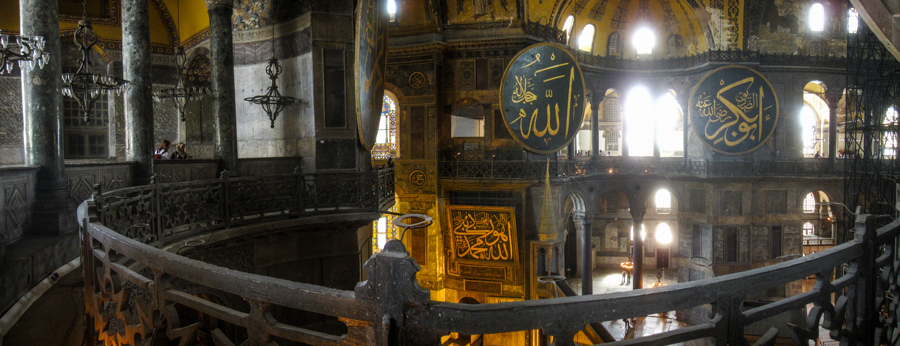
On the central Mihrab, a cat basking in the warmth of a lamp has everyone in distressed excitement.
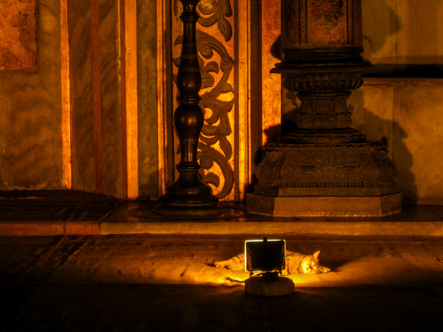
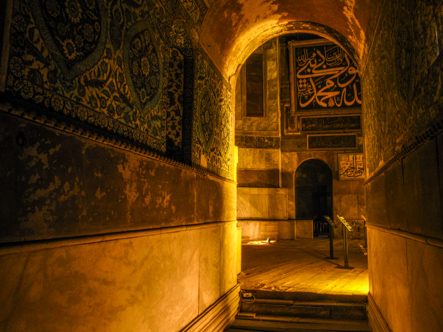
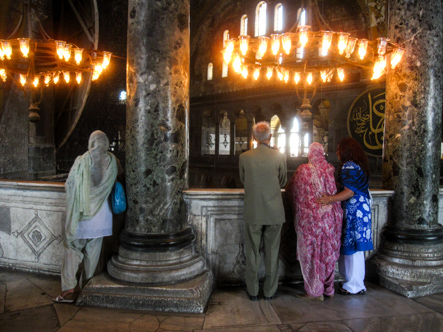
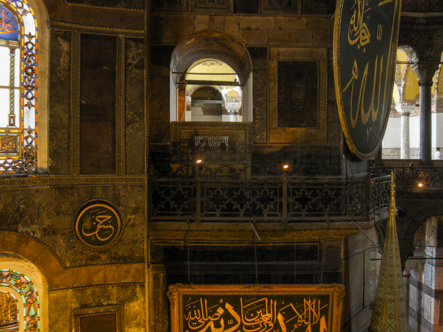
Reunited with old friends, games of backgammon, to Mars.

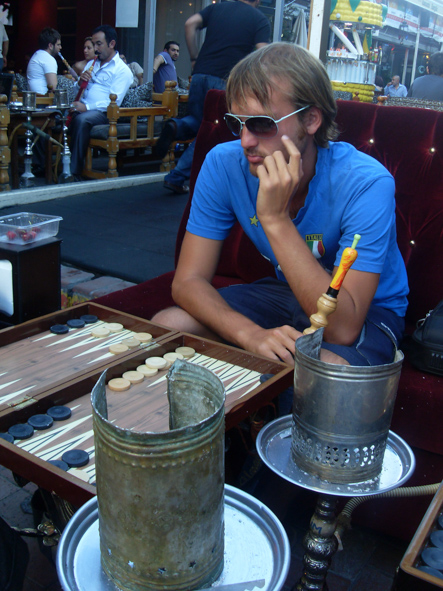
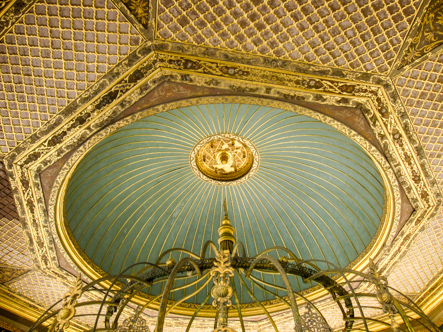

The spice bazaar (Mısır Çarşısı), and the Grand Bazaar (Büyük Çarşı). Riots of color.
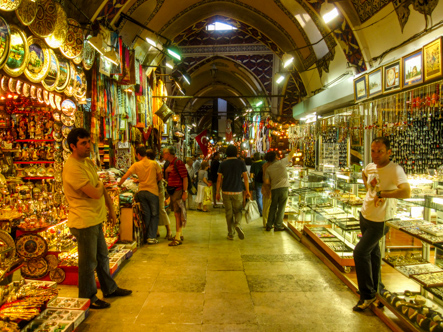
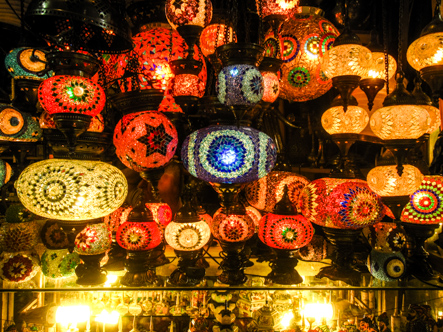
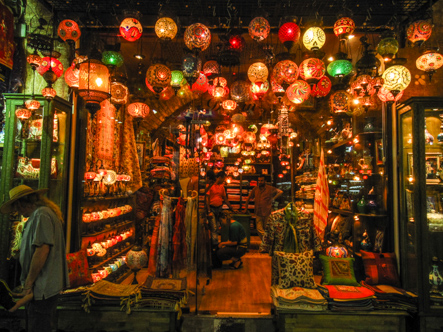
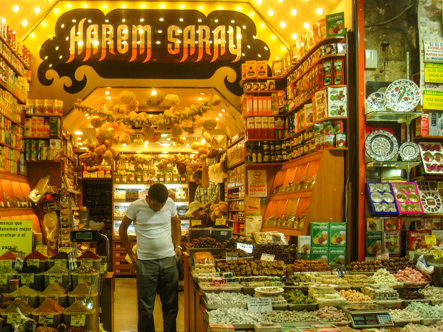
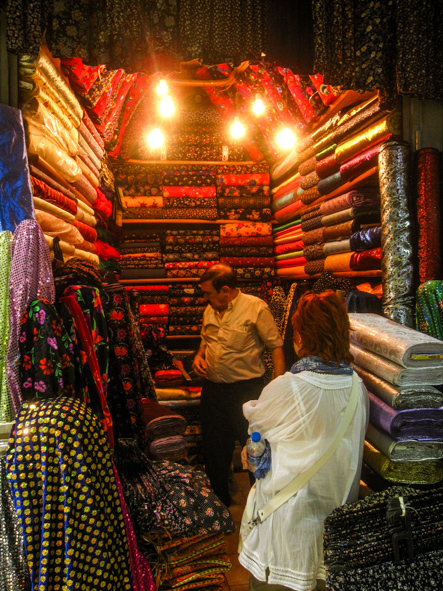
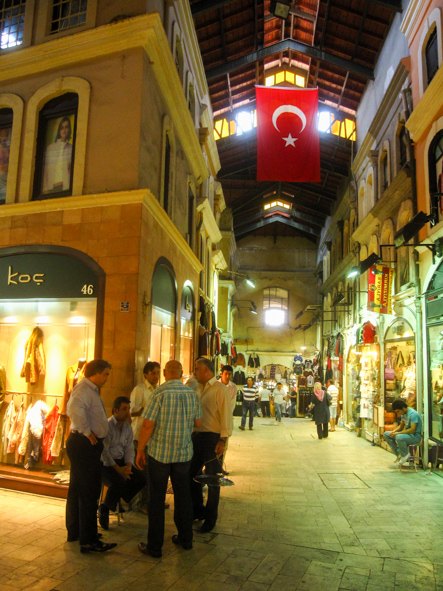
Mosque details.
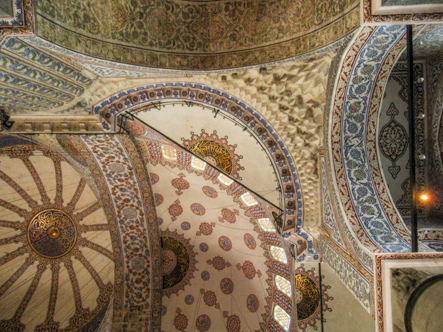
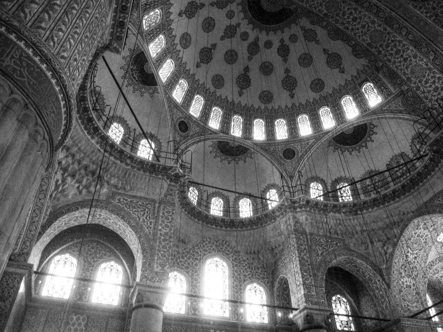
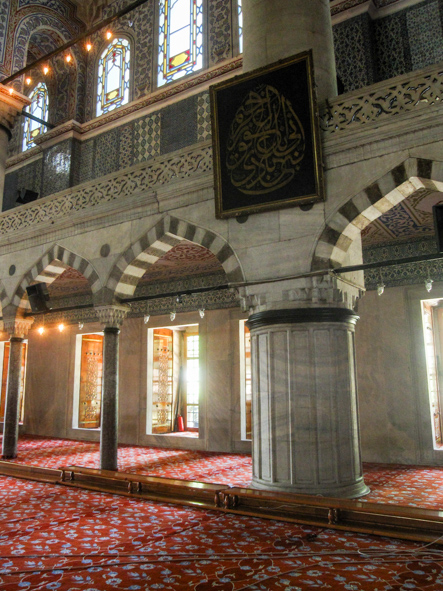

Between the spice bazaar and the Yeni Cami ("New Mosque") a row of men washing their feet, hands, faces outside.
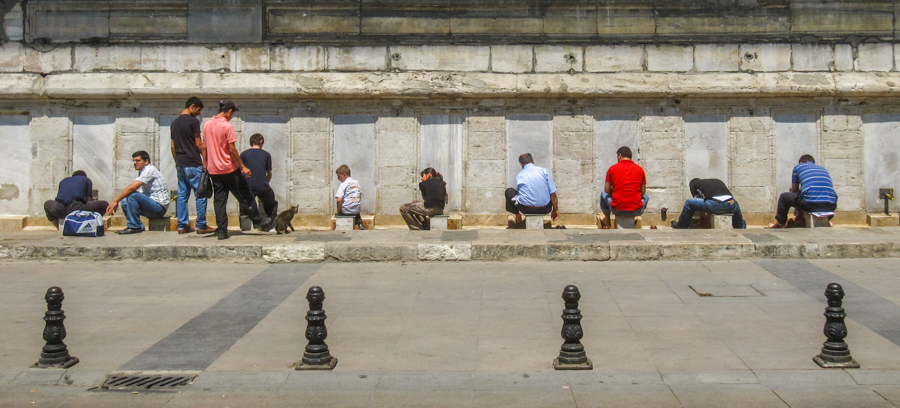
The inside of the Yeni Cami. The boy in the gown and specter is one of several we see in the city, undergoing part of their passage to manhood – circumcision.
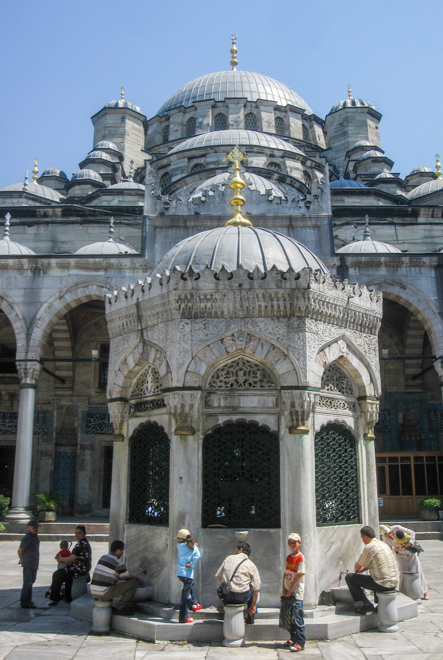
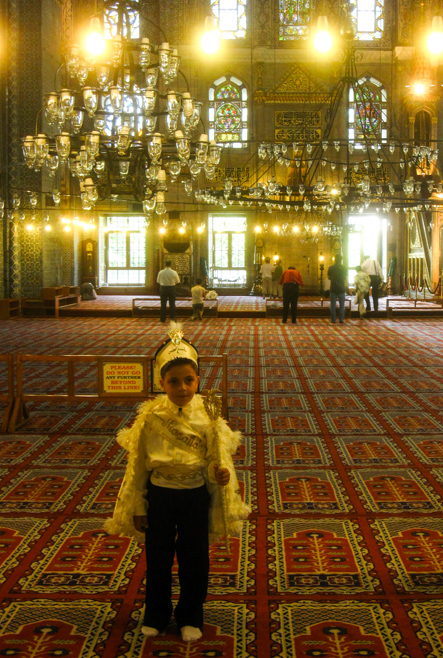
From top to bottom:

The inside of the Blue Mosque, or Sultan Ahmed Mosque, is covered in exquisite blue tiles. The ceiling:
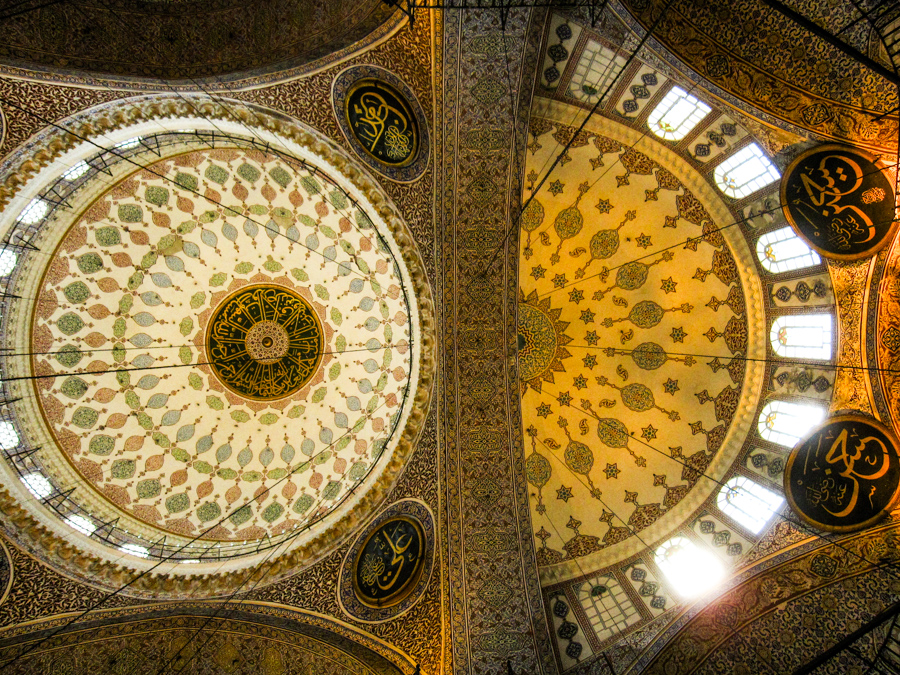
Scenes in the Blue Mosque:

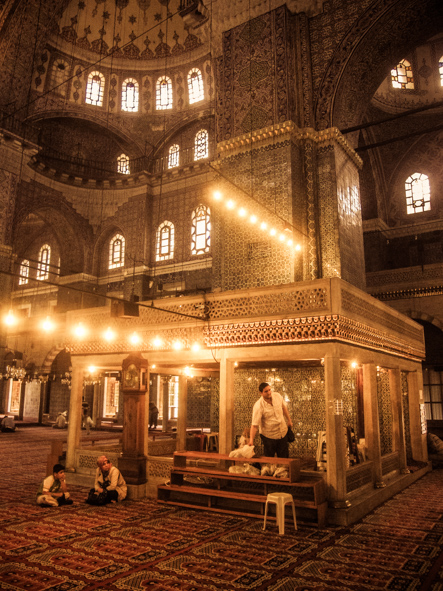
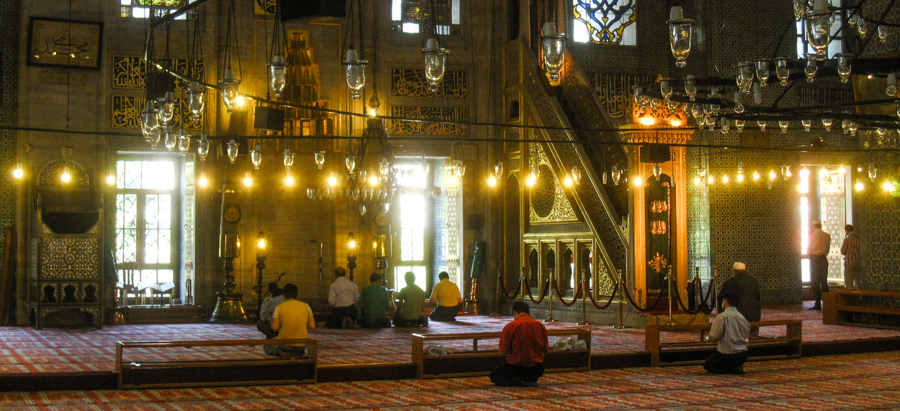
Palaces, the Bosporus - the division of Europe and Asia - and the Basilica Cistern, deep beneath the city.
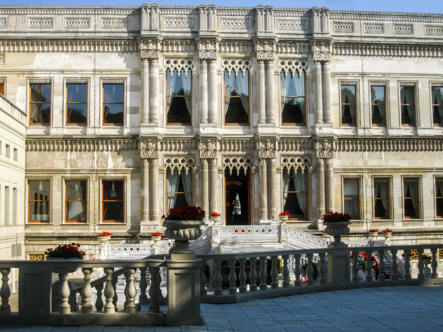
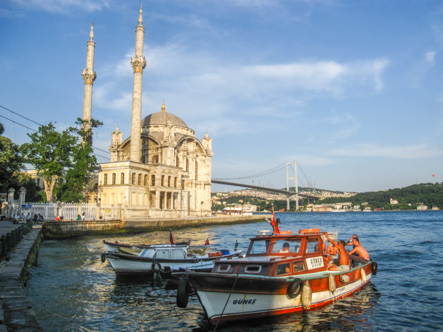
One of the specialties of tourist-Istanbul is freshly caught fish, perhaps from fisherman perched along all the bridges of the Bosphorus and the Golden Horn, freshly fried and stuffed inside a bun of bread with some onions. "Balik Ekmek" – "fish bread." Is delicious. For a slightly more upscale dining experience, the underside of the Galata Bridge is lined with seafood restaurants just over the water.
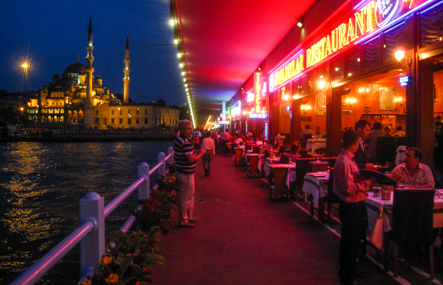
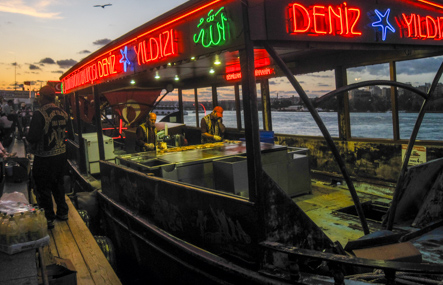
Real, working Istanbul, at night.
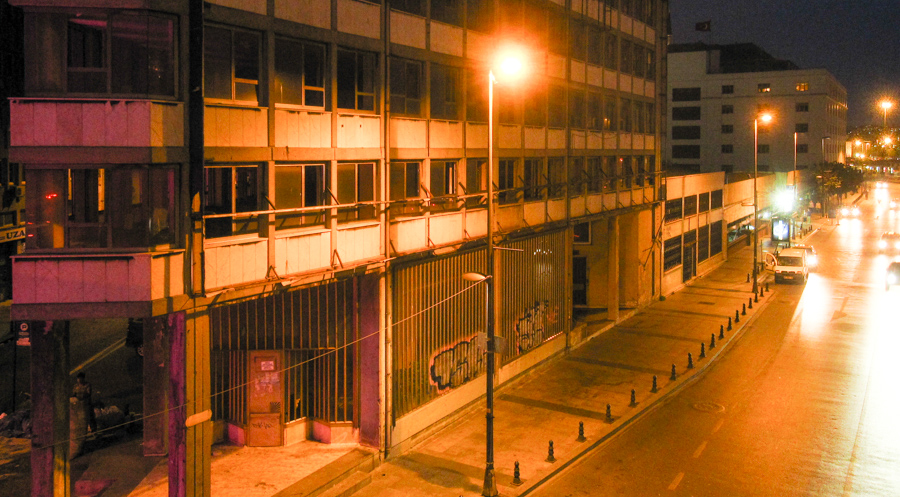
One of the palaces of Istanbul I venture to is Topkapı, filled with unbelievable Islamic architecture and decorations.
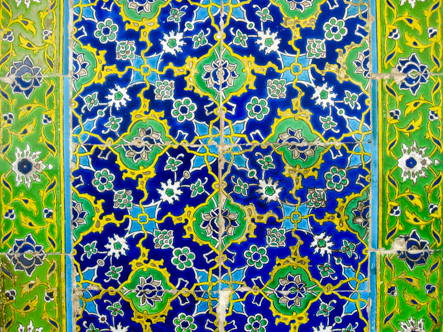

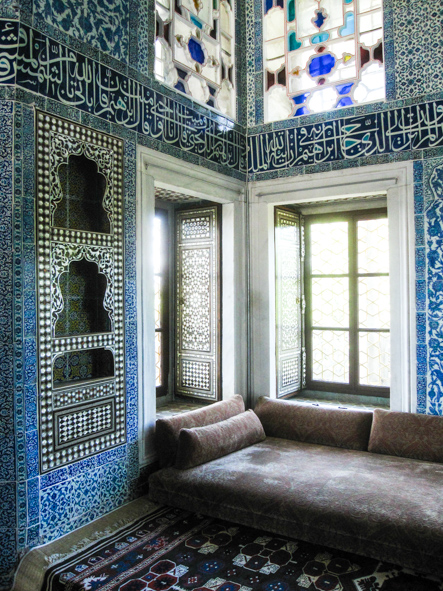
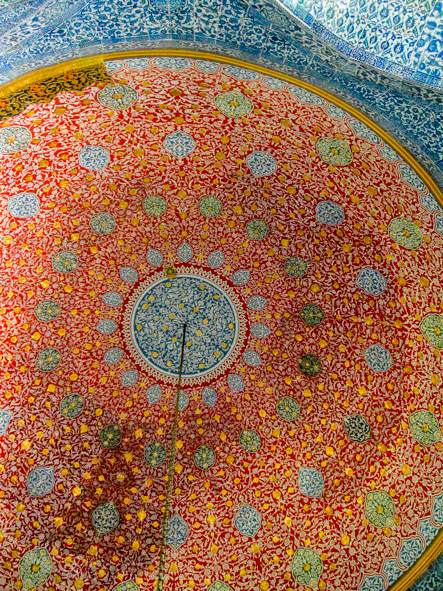
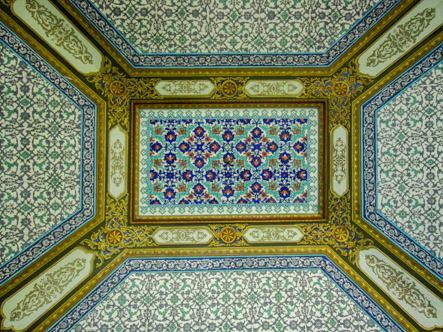
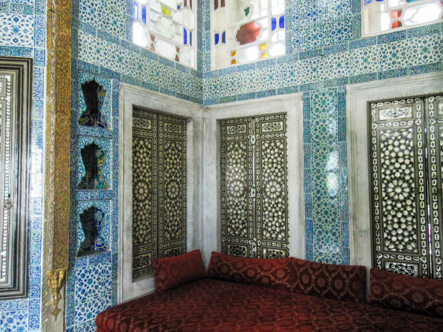
Topkapı Palace is a sprawling affair, with sweeping vistas over the Bosporus.
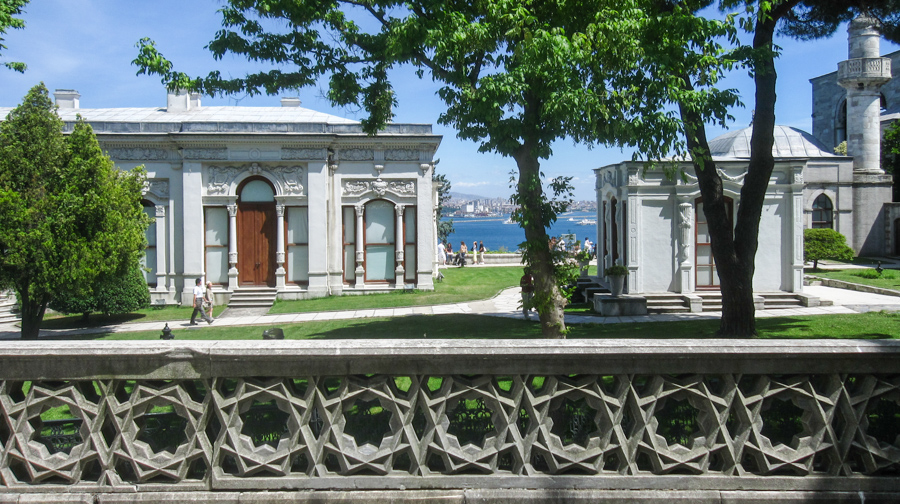
Inside the harem:
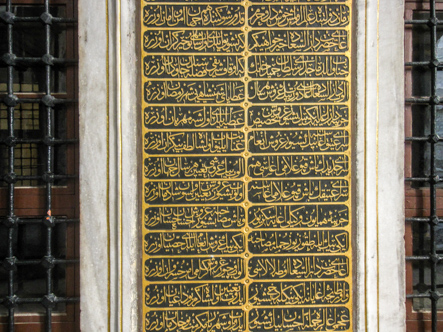
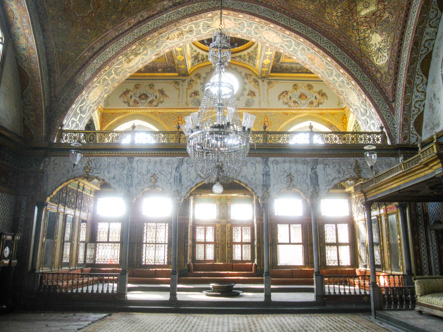

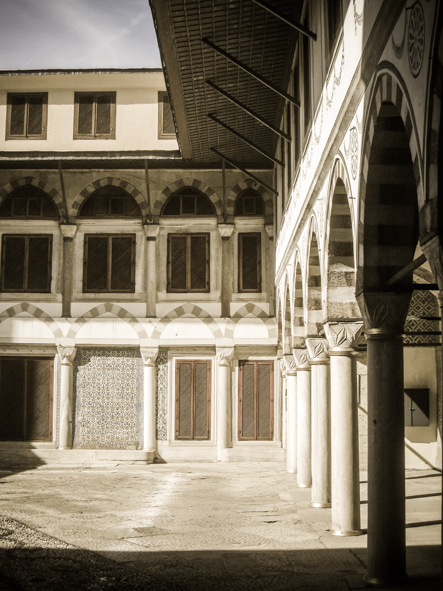
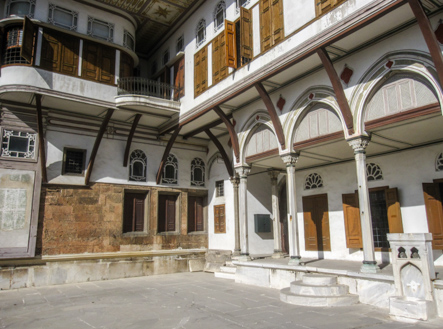
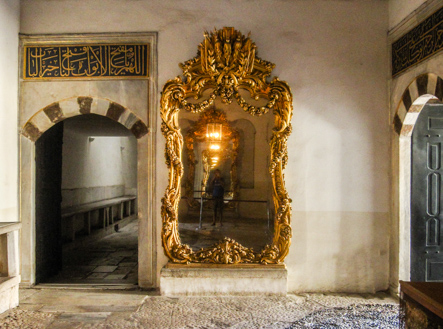
A second palace visit: Dolmabahçe, is the most beautiful building I have ever seen. No photography allowed, though Wikipedia has a few shots. Just to whet the appetite for something slightly off the tourist trail:
Mustafa Kemal Atatürk, the founder and first President of the Republic of Turkey, used the palace as a presidential residence during the summers and enacted some of his most important works here. Atatürk spent his last days in this palace, where he died on November 10, 1938. Contains the world's largest Bohemian crystal chandelier, a gift from Queen Victoria. The palace has an area of 45,000 m2 (11.2 acres), and contains 285 rooms, 46 halls, 6 baths (hamam) and 68 toilets. The famous Crystal Staircase has the shape of a double horseshoe and is built of Baccarat crystal, brass and mahogany. The palace includes a large number of Hereke palace carpets made by the Hereke Imperial Factory. Also featured are 150-year-old bearskin rugs originally presented to the Sultan as a gift by the Tsar of Russia.
Also, ferries and walks up through Beyoğlu and Beşiktaş.
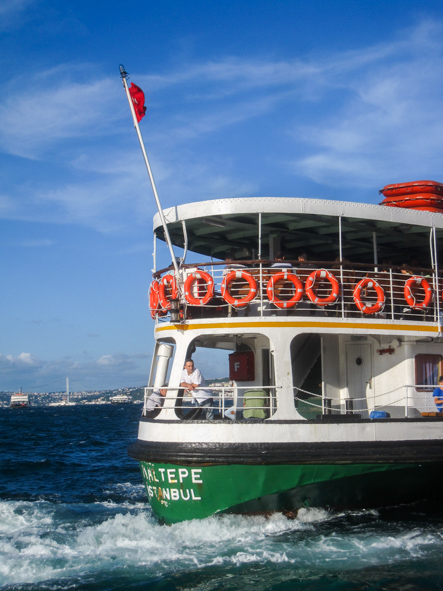
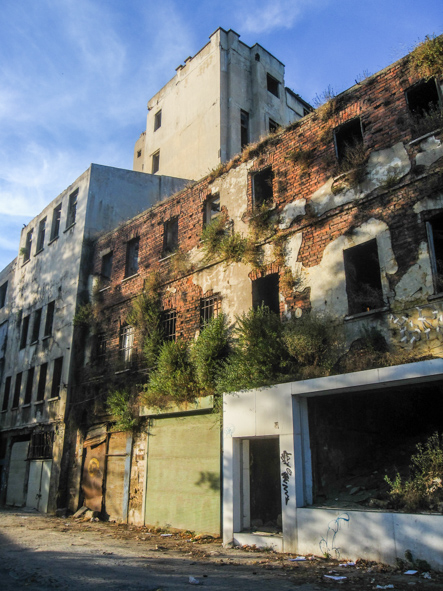
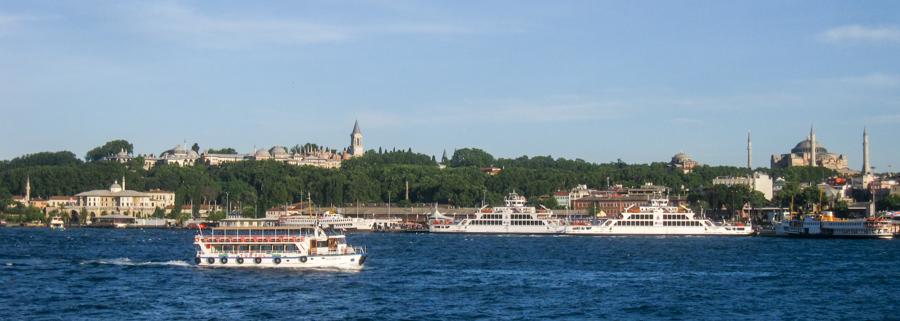
And: kumpir! (the most delicious thing in the world, like some sort of amazing baked potato) in Ortaköy, a meyhane and general merriment in Taksim, nargile (shisha) pipes in Tophane, the ferry over to Kadıköy and a tea time at a çay bahcesi (tea house).
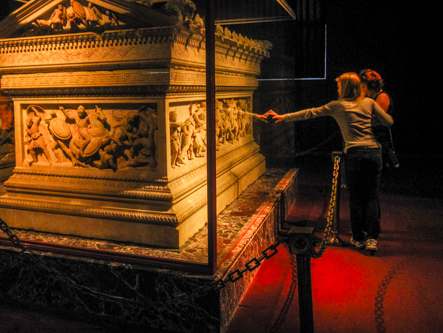
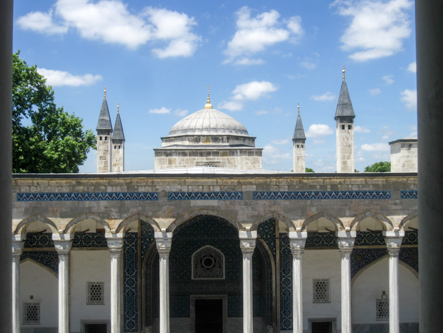
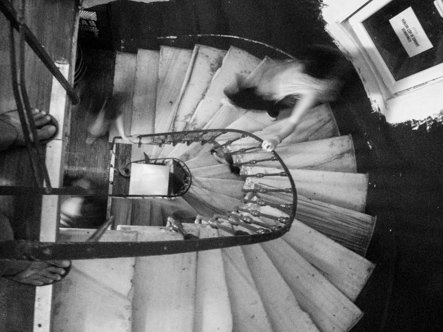
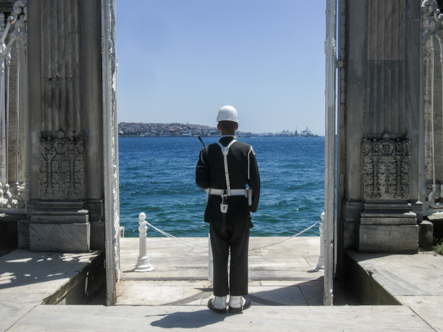
Fishing off the bridges at sunset. Flags of the Turkish Republic, mosques - the skyline of Istanbul.

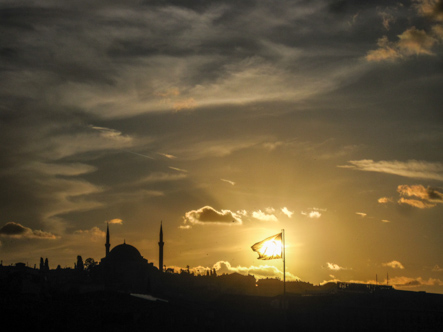
Abandoned tankers lopsided on the rocks in Üsküdar, a perfect backdrop for a swim.
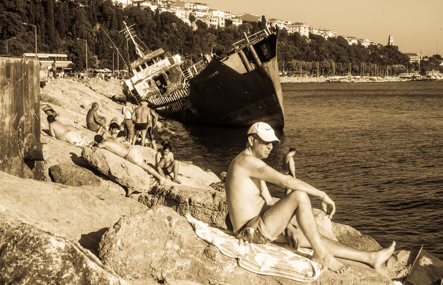
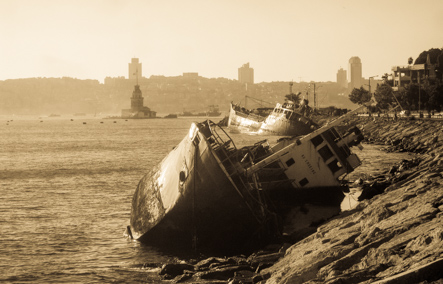
I love the names of Istanbul's neighborhoods, so evocative and filled with the ring of history. This city is one place I need not even promise to return to, the inevitability is clear. But despite my infatuation, at the end the train station beckons, as it invariably will. As we pull out of the station, lights streaking by, I meet the curious old man who will share my cabin on the overnight train which sees me across the border into Bulgaria.
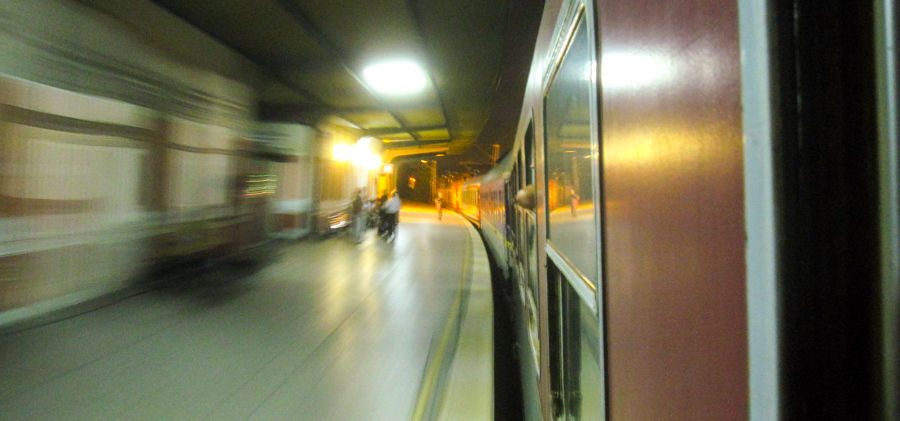
After a little over four months in the Middle East I turn back towards Europe.
